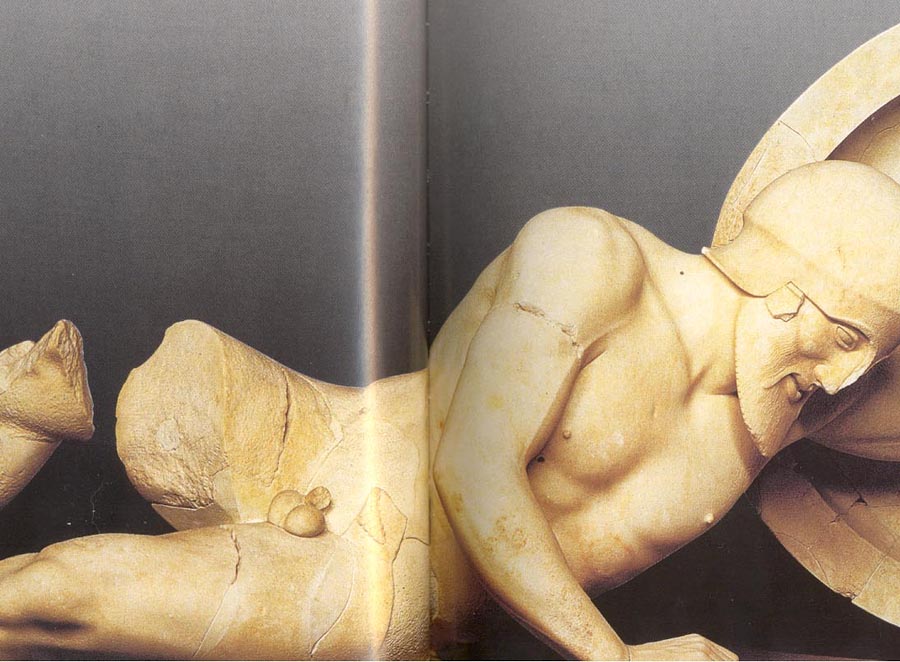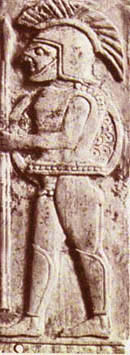




NY Times attacks "Manly" movie and its "Warrior Ethic"
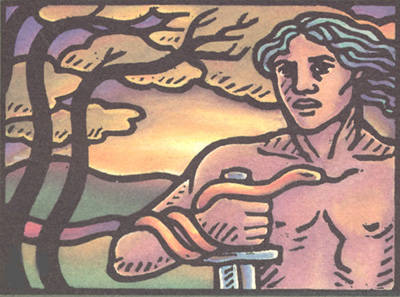


NY Times attacks "Manly" movie and its "Warrior Ethic"
3-10-2007
NY Times movie critic A. O. Scott yesterday attacked a new film version of the Battle of Thermopylae, in which 300 Spartan Warriors withstood the might of the Persian Empire and died to a man -- as --
"Manly."
Yep.
Mr Scott, a critic for the nation's leading paper of record, actually used the word "manly" as a term of derision.
Here's the title of the review:
Battle of the Manly Men: Blood Bath With a Message
So: Mr Scott doesn't like Manly Men.
There are other terms and phrases of derision and abuse in the review:
"warrior ethic"
"valor and freedom"
"noble purpose"
"higher cause"
"free, manly men"
"fight harder and more valiantly"
"muscle-bound"
"wrestling"
and "grunting"
Mr Scott doesn't like grunting.
Wrestling, valor, freedom, ethics, noble purposes, higher causes, and free manly men -- he doesn't like any of those things.
Now -- the movie may be dreadful -- I haven't seen it so I don't know.
And I doubt there's any mention of the "homosexual pairbonding" which, according to the Britannica, kept hoplite bonds at a level of "ferocious intensity."
But, let's take a look at Mr Scott's review:
Battle of the Manly Men: Blood Bath With a Message
By A. O. SCOTT
Published: March 9, 2007
"300" is about as violent as "Apocalypto" and twice as stupid. Adapted from a graphic novel by Frank Miller and Lynn Varley, it offers up a bombastic spectacle of honor and betrayal, rendered in images that might have been airbrushed onto a customized van sometime in the late 1970s. The basic story is a good deal older. It's all about the ancient Battle of Thermopylae, which unfolded at a narrow pass on the coast of Greece whose name translates as Hot Gates.
Hot Gates, indeed! Devotees of the pectoral, deltoid and other fine muscle groups will find much to savor as King Leonidas (Gerard Butler) leads 300 prime Spartan porterhouses into battle against Persian forces commanded by Xerxes (Rodrigo Santoro), a decadent self-proclaimed deity who wants, as all good movie villains do, to rule the world.
The Persians, pioneers in the art of facial piercing, have vastly greater numbers -- including ninjas, dervishes, elephants, a charging rhino and an angry bald giant -- but the Spartans clearly have superior health clubs and electrolysis facilities. They also hew to a warrior ethic of valor and freedom that makes them, despite their gleeful appetite for killing, the good guys in this tale. (It may be worth pointing out that unlike their mostly black and brown foes, the Spartans and their fellow Greeks are white.)
But not all the Spartans back in Sparta support their king on his mission. A gaggle of sickly, corrupt priests, bought off by the Persians, consult an oracular exotic dancer whose topless gyrations lead to a warning against going to war. And the local council is full of appeasers and traitors, chief among them a sardonic, shifty-eyed smoothy named Theron (Dominic West, known to fans of "The Wire" as the irrepressible McNulty).
Too cowardly to challenge Leonidas man to man, he fixes his attention on Queen Gorgo (Lena Headey), a loyal wife and Spartan patriot who fights the good fight on the home front. Gorgo understands her husband's noble purpose, the higher cause for which he is willing to sacrifice his life. "Come home with your shield or on it," she tells him as he heads off into battle after a night of somber marital whoopee. Later she observes that "freedom is not free."
Another movie -- Matt Stone and Trey Parker's "Team America," whose wooden puppets were more compelling actors than most of the cast of "300" -- calculated the cost at $1.05. I would happily pay a nickel less, in quarters or arcade tokens, for a vigorous 10-minute session with the video game that "300" aspires to become. Its digitally tricked-up color scheme, while impressive at times, is hard to tolerate for nearly two hours (true masochists can seek out the Imax version), and the hectic battle scenes would be much more exciting in the first person. I want to chop up some Persians too!
There are a few combat sequences that achieve a grim, brutal grandeur, notably an early engagement in which the Spartans, hunkered behind their shields, push back against a Persian line, forcing enemy soldiers off a cliff into the water. The big idea, spelled out over and over in voice-over and dialogue in case the action is too subtle, is that the free, manly men of Sparta fight harder and more valiantly than the enslaved masses under Xerxes' command. Allegory hunters will find some gristly morsels of topicality tossed in their direction, but you can find many of the same themes, conveyed with more nuance and irony, in a Pokemon cartoon.
Zack Snyder's first film, a remake of George Romero's "Dawn of the Dead," showed wit as well as technical dexterity. While some of that filmmaking acumen is evident here, the script for "300," which he wrote with Kurt Johnstad and Michael B. Gordon, is weighed down by the lumbering portentousness of the original book, whose arresting images are themselves undermined by the kind of pomposity that frequently mistakes itself for genius.
In time, "300" may find its cultural niche as an object of camp derision, like the sword-and-sandals epics of an earlier, pre-computer-generated-imagery age. At present, though, its muscle-bound, grunting self-seriousness is more tiresome than entertaining. Go tell the Spartans, whoever they are, to stay home and watch wrestling.
"300" is rated R (Under 17 requires accompanying parent or adult guardian). Much butchery, some lechery.
Bill Weintraub:
This movie may be an utter dog -- I don't know, because like I say I haven't seen it.
But Mr Scott's whipped himself into a lather out of all proportion to what he reports.
Let's take a look at Mr Scott's derisory list again:
"warrior ethic"
"valor and freedom"
"noble purpose"
"higher cause"
"free, manly men"
"fight harder and more valiantly"
"muscle-bound"
"wrestling"
Do those words correspond to the historic reality?
As a matter of fact, they do.
Was the Battle of Thermopylae about "free, manly men," informed by a "warrior ethic" and with a "noble purpose," fighting for "valor and freedom?"
YES.
Did they "fight harder and more valiantly" than the Persians?
YES.
Was that because they were "free?"
YES.
That's the uniform judgment of history about this conflict and this particular battle.
Too bad for Mr Scott.
But a good thing for the Western world and indeed the entire world, for the Battle of Thermopylae, fought by those manly men of valor and freedom, insured that the following would one day become if not the property at least the aspiration of all humankind:
The list is the creation of classicist Victor Davis Hanson.
And it's a good one.
Professor Hanson by the way wrote the definitive book on hoplite warfare, The Western Way of War.
It too is good.
So: Could we correctly say, and would most people say, that to fight for freedom against a foreign tyrant is a "higher cause?"
YES.
Is that what the Greeks did?
YES.
So why does Mr Scott have a problem?
Because the Spartans are portrayed as "manly men?"
Who show a "gleeful appetite for killing?"
What would he like the Spartans to do against the Persians, who were planning on conquering and enslaving the Greeks?
Meet them up on Thermopylae, get on all fours, and offer them their asses for fucking?
Constitutional government, civil liberties, free exchange of ideas, self-critique, private property, capitalism, and separation between religious and political/scientific thought.

Oh, please, please, Mr Persian, fuck me please.
Rape my wife, kill my kids, steal my land, and make me your buttslave.
What alternative was there to MANLINESS and KILLING in this particular instance?
The Persians had no legitimate business in Greece.
They were there to kill and enslave the Greeks, and ELIMINATE FOREVER the sort of FREEDOM they'd seen in the Greek city-states of Asia Minor -- Ionia -- which they'd already conquered.
That's why they were there.
To kill and enslave.
What part of "kill and enslave" does Mr Scott not understand?
"Come home with your shield or on it!"
Mr Scott derides those words too.
Yet that's a direct quote from Plutarch's Sayings of the Spartans -- in Plutarch, as every schoolboy once knew, it's said by a mother, not a wife -- and we're lucky the Spartans believed it.
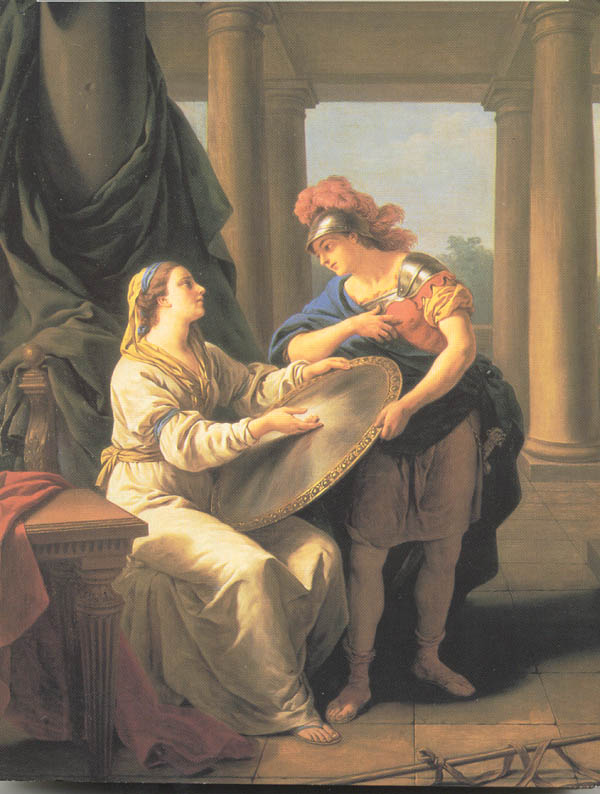
Spartan Mother and Son
Because by dying at Thermopylae, they bought the Athenians time to assemble a navy and inflict a defeat on the Persians at Salamis.
The Spartans died so that other Greeks could live FREE.
If that's not a "noble purpose" and a "higher cause," I don't know what is.
And where they died these words were carved into the rock:
Go tell the Spartans, stranger passing by,
That here obedient to their laws we lie.
Mr Scott also smears the Spartans -- and by implication, the other Greeks -- with a charge of racism which is UTTERLY UNTRUE:
It may be worth pointing out that unlike their mostly black and brown foes, the Spartans and their fellow Greeks are white.
So what?
In this instance, it was the intent of the Persians, whatever their skin color, to enslave the Greeks.
While the Greeks themselves were not racist.
As a matter of fact, Mr Scott's very own newspaper just a few days ago ran the obit of a noted Black scholar of the ancient world, Dr. Frank M. Snowden Jr.:
Whites in the ancient world rarely equated blackness with subordination, Dr. Snowden argued, because the black people they encountered were rarely slaves. (Most slaves in the Roman Empire, for instance, were white.) Instead, they met blacks who were warriors, statesmen and mercenaries.
While some critics accused Dr. Snowden of idealizing the past, he maintained throughout his career that racial bias was a relatively modern phenomenon.
"Nothing comparable to the virulent color prejudice of modern times existed in the ancient world," Dr. Snowden wrote in "Before Color Prejudice." He added: "The ancients did not fall into the error of biological racism; black skin color was not a sign of inferiority; Greeks and Romans did not establish color as an obstacle to integration."
[emphases mine]
THAT'S THE TRUTH.
And it's sickening to see Mr Scott, in his unholy haste to attack masculinity and manly men who dare defend their homes, making such a nasty and totally unfounded allegation.
Now: what about the physical appearance of the Spartans?
Which Mr Scott does not approve of.
Well, here are some stills from the movie:
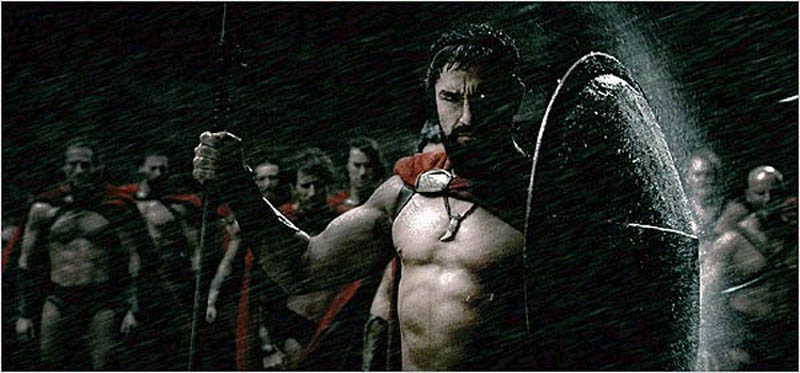
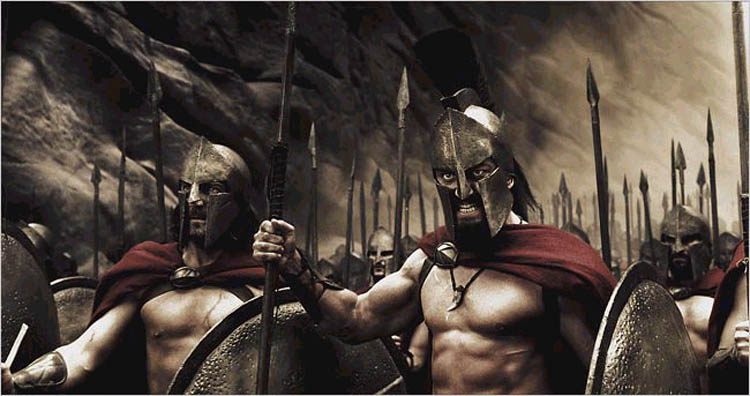
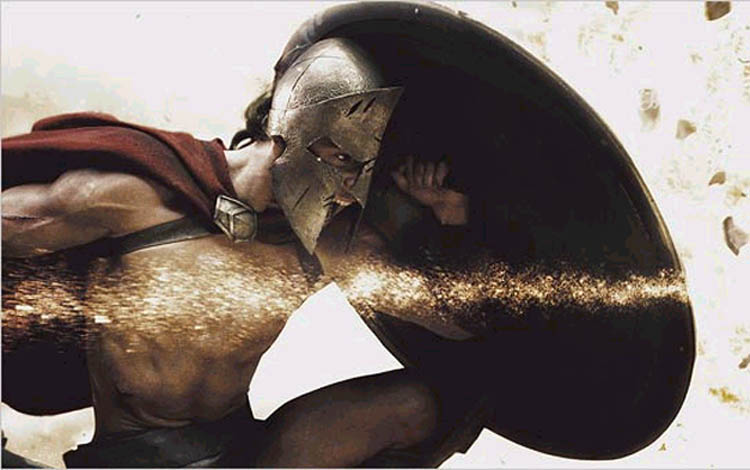
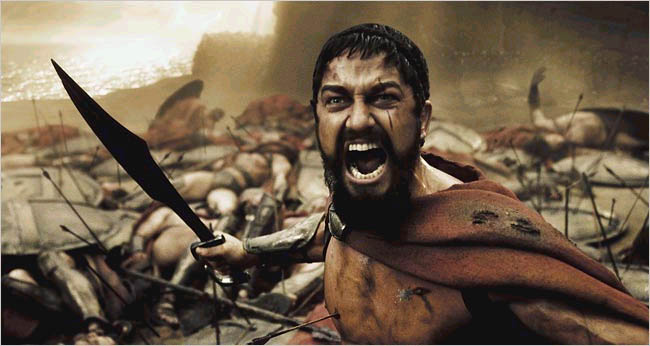
The actors are muscular.
I don't know if they're "muscle-bound" -- because you can be muscular without being muscle-bound -- but the actors are muscular.

It's unfortunate and indeed silly in the extreme that they're wearing little running shorts -- see actor on left -- because they didn't have running shorts in the 5th century BC.
They didn't need them.
Unlike the emasculated and effeminized males of modern America, they weren't afraid of their own scrotums.
To the contrary, they were proud of them.
That's why their scrotums, along with their penises, are almost always visible in Greek art.
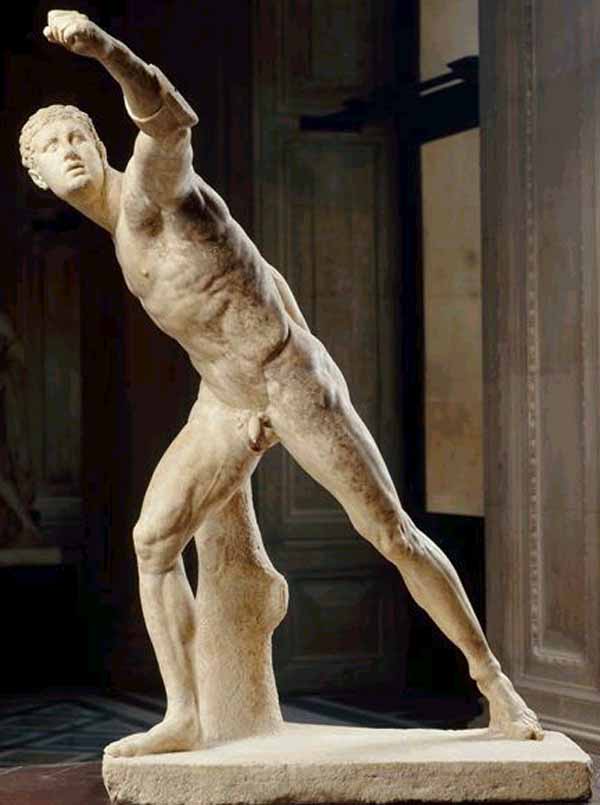
As they were in real life.
Now, do these "muscle-bound" actors bear any resemblance to ancient Greek warriors?
Well, let's be clear that Warriors were not and are not gym-bunnies.
It's far more important to be limber and skilled than to have big muscles.
Nevertheless, here's an ancient Greek helmet, which was taken from a hoplite and offered to Zeus at his shrine at Dodona:
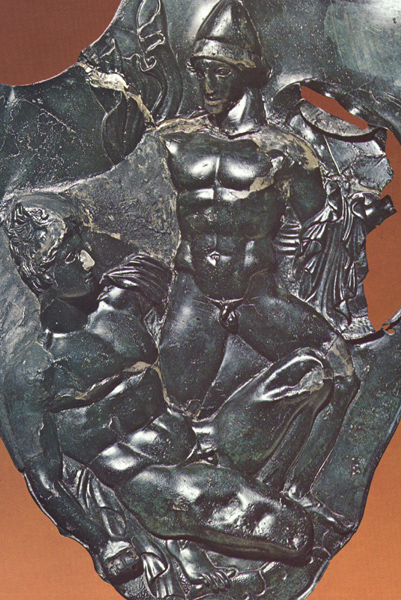
Hmmmmmmmmmmm.
Both warriors have -- MUSCLES.
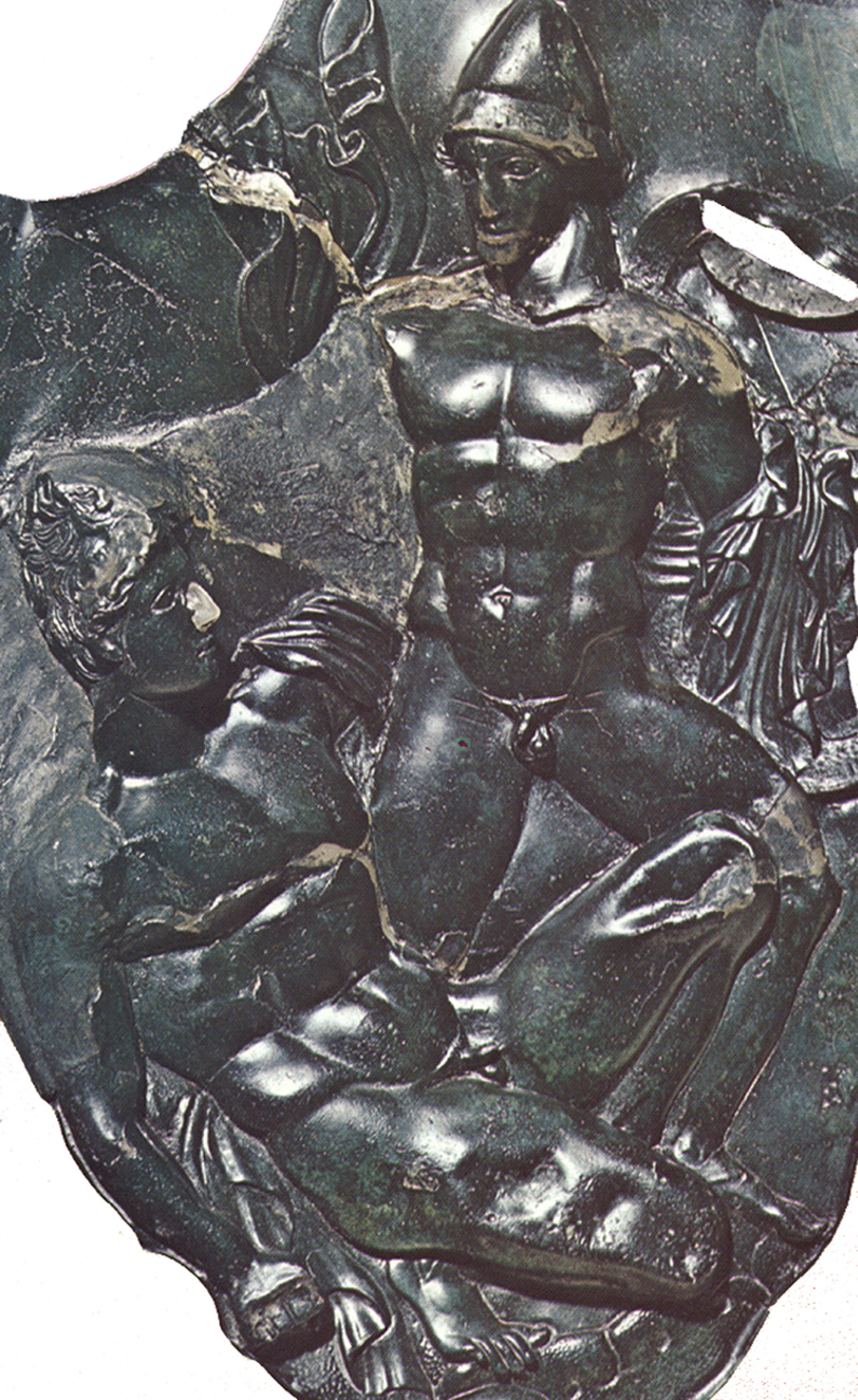
And scrotums.

This by the way is a picture of Mr Scott:

Nice tie.
Kinda conventional looking though, isn't he?
I know, I know, that's not fair.
But, I mean, it suggests that he may bear what might be called a personal animus towards actors who have all their hair.
Not to mention scrotums.
Oh, I almost forgot.
What about "wrestling?"
And "grunting?"
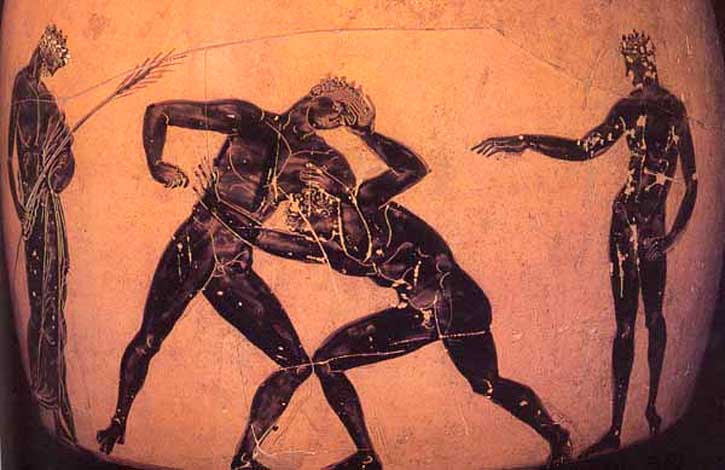
Well, wrestling and other fight sports were a daily part of the Spartans' and other Greek citizen-soldiers' training regimen.
They wrestled every day.
And no doubt when they wrestled, they grunted.
That's what MEN do when they're EXERTING themselves.
FIGHT sports -- wrestling, boxing, and pankration -- along with running -- were the primary events at their various athletic festivals, which were also religious festivals, including the Olympiad.
And accounts of wrestling and other fighting -- dare we say "gleeful" fighting -- loom large both in Greek mythology and in Greek history.
And in Greek literature -- in poets such as Pindar, and Apollonius of Rhodes, and Statius -- of Rome.
Wrestling and boxing and pankration in short were core to who these MEN were:

Fighters
Now: I've been loathe to recommend this movie because I doubt that it talks about the true Spartan warrior-bond, which was unabashedly sexual.
Here's what Plutarch says about the agoge's effect on boys:
[They were trained] to endure pain and conquer in battle. To this end, as they grew in years, their discipline was proportionately increased; their heads were close-clipped, they were accustomed to go barefoot, and for the most part to play naked.
After they were twelve years old, they were no longer allowed to wear any undergarment; they had one coat to serve them a year; their bodies were hard and dry, with but little acquaintance of baths and unguents; these human indulgences they were allowed only on some particular days in the year. They lodged together in little bands upon beds made of rushes that grew by the banks of the river Eurotas, which they were to break off with their hands without a knife; if it were winter, they mingled some thistle down with their rushes, which it was thought had the property of giving warmth. By the time they were come to this age there was not any of the more hopeful boys who had not a lover to bear him company.
"their bodies were hard and dry"
That's what they looked like.
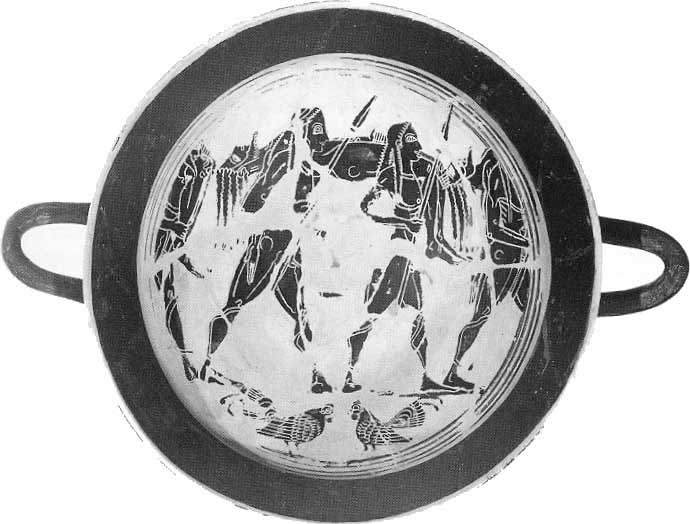
Spartan Warriors
What was the point to the agoge?
It wasn't just the training.
The Britannica (1992) says: "a system of homosexual pair-bonding maintained the normal hoplite bonds at a level of ferocious intensity."
Ferocious intensity.
That's what it was about.
The ferocious intensity of bonds between MEN who FOUGHT and LOVED.
Like I said, I'm not recommending "300" because I doubt that it portrays that male-male warrior-warrior pair-bonding which was of such a ferocious intensity.
But -- if the movie reflects the ferocity of the Spartans -- in all their muscular, grunting, MANLY FREE NOBLE WARRIOR glory -- so be it.
Even Mr Scott admits that there are "a few combat sequences that achieve a grim, brutal grandeur..."
"Grandeur"
A word I've been known to use myself in describing the ancients, and their view of nature.
This by the way is classicist Michael Grant's description of the agoge and the Spartans -- it's from his book The Founders of the Western World, which is who these men were:
Examined soon after birth, all Spartan infants, if weak or deformed, were thrown over a cliff and killed. Those [males] who survived, at the age of seven or eight, were removed from their families and drafted into a 'herd' [known as the herd of young bull calves], under the control of a senior Spartiate [full-fledged Spartan citizen]. And for the next two decades they worked their way through a brutalizing series of state-oriented training programmes. During the course of this period, at the age of about twenty, they became eligible for one of the Spartan messes or dining clubs, each of which possessed about fifteen members. Their food was awful, but each member had to pay a mess-bill; and failure to pay -- or, for that matter, to endure the severities of the training curriculum -- resulted in deprivation of Spartiate status.
12345678910
Spartan Hoplites
with scrotumsWhen these young men joined the Assembly, at the age of thirty, they had become ruthless, taciturn and unquestioning. Their predominant ethos was homosexual, but they were expected to marry in order to produce children. Their brides had to undergo a macabre wedding ceremony. Subsequently, however, the barrack-room existence to which their husbands were tied left these women a good deal to themselves. Moreover, their biological role as bearers of Sparta's children did not go unrecognized, so that they enjoyed unusual day-by-day and legal freedom. ...
[emphasis mine]
What do the Spartans and Mr Scott have to do with us?
Well, as luck would have it I just got an email from Frances in which she explains it all very neatly:
I know ... you want guys to share in the Warrior Dream which you know would transform them into men, which many of them are not. And, that is NOT because of who they sleep with or don't sleep with. It's about as you say having a true fighting spirit that fights for what is right.
To me that's what manhood is, and most men, and I don't care how they self-identify, do not have true fighting spirit. Power is far less assured when you have a bunch of bonded warriors to deal with who demand a say in things because of the promise of their blood that vouch-safes the security of the state, and more importantly to warriors the promise of their warrior brother's blood.
How safe would the political status quo be should that kind of energy be out there rather than the tired "the more I see, the less I know, the more I like to let it go" desire for oblivion that the status quo depends on and fosters?
Modern guys are dispirited. And, that's because they do live in a world where "scrotum" can't be read of, much less uttered. I hope some of them read that MEND article and look at those photos of Michael Kamber's. It seems really obvious now, but I didn't think of Egbesu, or whatever culture's War God of really being the collective unconscious of the warrior band. That makes sense, and seems incredibly obvious now. Getting incredibly screwed over for 40 years I guess does something to people. I guess the War God is always there.
That's right.
The War God is always there.
He's in the collective unconscious of the Warriors.
That means he's in your unconscious dude, just waiting for you to reclaim your Warrior Manhood and with it your FREEDOM.
Frances: "Power is far less assured when you have a bunch of bonded warriors to deal with who demand a say in things because of the promise of their blood that vouch-safes the security of the state, and more importantly to warriors the promise of their warrior brother's blood."
That's right.
Denying Men their Manhood is about control.
As Frances said, Men are controlled through their balls.
And through the denial of the Warrior bond -- which they form through their balls.
And isn't that what Mr Scott and his fellow feminized critics of the Times want?
Not Free MEN but controlled males.
You guys need to realize the extent to which reviews like this one contribute to the ongoing emasculation and enslavement of males.
So to hell with A O Scott.
Next time around, I hope whoever makes the 300 will show true MEN with true BALLS.
WARRIORS -- with their BALLS.
WARRIORS -- who aren't afraid to LOVE -- other WARRIORS.
That's what we're working for.
A world in which MEN can once again be MEN.
A world in which MEN can once again be WARRIORS.
A world in which all MANKIND can be FREE.
Bill Weintraub
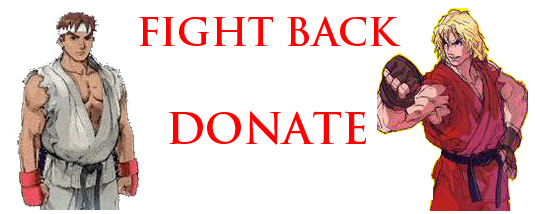
© All material Copyright 2007 by Bill Weintraub. All rights reserved.
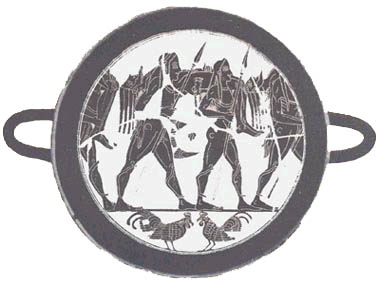
Warrior Brother's Blood

Warrior Brother's Blood
Re: NY Times attacks "Manly" movie and its "Warrior Ethic"
3-10-2007
I'm very suspicous about this movie "300" mainly because I have a bad feeling that it'll end up like "Troy." There were so many things that bothered me about that movie that I can't name all of them. I can name a few, though, one was the complete removal of the gods, anyone who has read the Iliad (I haven't read all of it, but I have read some of it) knows that the gods played a significant role in the story as they dictated how the battle whould go or what would happen in who's favor, I could have gotten over that, I also could've gotten over the fact that they romanticized Achilles' relationship with Briseis, but the one absolute atrocitiy they commited in that movie was to completely edit out Achilles' relationship with Patroclus; sure the relationship is there but it is no where near as intimate and intense as it was in the Iliad. I could never forgive the director for that.
As for the review, it seems that Mr. Scott is completely ignorant of the Greeks, and especially the Spartans since he says "Go tell the Spartans, whoever they are, to stay home and watch wrestling." Yeah, that sentance, along with a few others, completely shows that he knows nothing of ancient cultures.
Another interesting tid bit I picked up was the part where he speaks about the Persians being portrayed as "mostly black and brown" and yet in the last sentence of the sixth paragraph he states that "I want to chop up some Persians too!" I get the feeling he's beeing sarcastic, but since this guy attacks masculinity, I wouldn't put it past him to be a bit prejudice.
As for Mr. Scott himself, well judging from his apperance, he doesn't look like the kind of man that would lay his life down for his country or his fellow man like the Spartans would've. Could he become a man that will lay his life down for his country and fellow man? Most likely he would've, if he hadn't grown up in corporate America which doesn't see you as an idividual with morals and emotions, but as another number that will give them more money.
Mr. Scott should not be disgusted by masculinity, he should be embracing it. He should be proud of it. He should be living it, and so should all of you. Don't let this Mr. Scott degrade a man's sacred masculinity just because he doesn't like it, fight back!!!
Michael
Re: NY Times attacks "Manly" movie and its "Warrior Ethic"
3-11-2007
Bill
You're right on the mark with your assessment of the NYT review. I read a few others (Atlanta Journal-Constitution, Boston Globe, Wall Street Journal) and all took more or less the sneering tone towards the warrior ethos, fighting for ideals and the same implication of racism with some homophobia thrown in. The Globe: " '300' is about a bunch of hot white metrosexuals -- those pecs, those abs, that hair -- against a million freaky nonwhite club kids. In other words, the gays. King Xerxes's hangout is full hookah-puffers, derelicts, and girls making it with girls (let's call them lesbians)." The review ends this way: "According to this outrageously flagrant movie, the Spartans didn't just die for Glory, Duty, and Destiny. They died to keep the Hot Gates from turning into another gay disco."
The AJC was the best of the lot, giving the movie a "B" rating (on an A-F scale), which is pretty good, as I've rarely seen anything rated higher than A-. But even in that review, there still was a snarky tone, with almost the same comparison as the Globe made, with different wording: the "gay," multi-racial Persians versus the "homoerotic," white Spartans. I don't think "homoerotic" was thrown in there because of any reference to hoplites or the agoge, just the knee-jerk comment whenever there's any indication of masculine men showing any closeness or bonding. While it is technically accurate, I detest the way that term is usually used.
It seems like its sole purpose is to categorize and marginalize men's feelings. As if by naming something you've explained it and diminished it to just another subcategory of human frailty. And it gets the desired reaction when used. Sort of like yelling out "snake" on a hiking trail. You freeze dead in your tracks.
Also, these reviews sound almost the same. Do they get together to discuss these things, or are they all so well trained that they are reacting the same way (and the wording was deliberate - it's a reaction, not thinking).
Having said all that, I think the movie itself is part of the problem.
Frances' comments are on target, too. She's absolutely right. Most men have been tamed to one degree or another, and a lot of them would be terrified if they met a truly free man, or were called upon to be one. As evidenced by the fact that other men are the ones who try to pull you back into conformity and the herd. "That's outrageous." "I can't believe you said that!" "I can't believe you think that way!" "You need to play the game" (One of my favorites). And my absolute favorite: "You're not (or You need to be) a team player" -- which is always said in a context where it means: "You have no say, so just shut up and you won't get in trouble. We're doing it my way, so you might as well sit back (or bend over) and enjoy it." It's given me a lot to think about. I know that I've given in and played along to some degree over the years, and have been too willing to let my "inner wimp" rule too much of my life. And it doesn't get you anything. And yet, I've always tried to keep part of me apart from the mess. I'm only able to give in so far. There's a point where I start digging in my heels, generally when I'm expected to take an active role in my own immolation.
Jim
Re: NY Times attacks "Manly" movie and its "Warrior Ethic"
3-12-2007
Hi Bill,
I agree with just about everything you and the others have said about "300". The only thing I have a slight disagreement about is the color thing.
History aside,I took from the movie that it was a propaganda piece about valiant western civilization fighting back the decedent middle eastern (Iranian) hordes. Perhaps I am too cynical these days, but I felt this was a movie done more to inflame passions against people in the middle east, Iranians in particular then to entertain.
But then of course I'm sure most Americans would not know that Iran was Persia
Bill G
Re: NY Times attacks "Manly" movie and its "Warrior Ethic"
3-13-2007
Thank you Michael and Jim and Bill G -- terrific posts.
Bill G, I hear you.
At the same time, historically there has been a clash between the West and Western values as I listed them in the message thread, and the East -- first in the form of the Persian Empire, and then in the form of Islam.
Thermopylae was literally the first battle in that war, which has continued in varying degrees of hot and cold for 2487 years.
That's the historic reality.
In terms of the movie being an attempt to inflame passions about the current situation in the Mid East, the comic book or "graphic novel" on which it's based was published in 1998.
So the book itself predates our current national concerns with Iraq and Iran.
Nevertheless, Bill, you're right that the movie did "inflame passions," -- at least on the Iranian side:
Iran outraged by Hollywood war epic
Tue Mar 13, 2007
TEHRAN (AFP) - War epic "300", a smash hit in the United States for its gory portrayal of the Greco-Persian wars, has drawn the wrath of Iranians for showing their ancestors as bloodthirsty "savages".
The press, officials and bloggers have united in denouncing the film as another example of "psychological warfare" against Tehran by its American arch enemy at a time of mounting tension over its nuclear programme.
...
That said guys, please remember that we don't use this forum to discuss issues like American foreign policy.
Our focus is Frot, Fidelity, and Masculinity.
The reason I reported on 300 was because of Mr Scott's review, in which he used "manly" and "warrior ethic" as terms of derision;
and that impacts upon one of our three core issues in opposing analism:
Masculinity
So that's why the message thread is here -- that, and the Greeks.
Now, I'm waiting for permission to post an email from another one of our Warriors who saw 300 and liked it.
His email is terrific, so I hope I can share it with you.
In the meantime, some of you may know that 300 has proven a hit with the moviegoing public -- at least for its first weekend.
Surprise! Spartans Assault Box Office
LOS ANGELES, March 11 -- Even a film business that expects big numbers is likely to be double-checking the box-office receipts for Warner Brothers' "300" on Monday and asking, "What just happened?"
The sword-and-sandals epic posted an estimated $70 million in ticket sales Friday through Sunday as it surged past hostile critics and industry expectations to become the fourth surprise hit in a winter season that began with a limp.
"We had projected it coming in around the mid-30s," said Dan Fellman, Warner's president of theatrical distribution, referring to the $30 million mark. "It's staggering."
...
And if the values espoused by the film are Warrior Values -- that's a good thing.
At the same time, Michael's correct that you can't trust movies like Troy or Alexander or 300 to give you an accurate view of the ancient world.
Movies are entertainment, they cost a lot of money to produce, and to make back that money they have to appeal to a very wide audience.
Which again is looking for entertainment, not history.
So movies are rarely cutting edge -- and rarely accurate.
They present what they think their viewers -- their target audience -- would like to see.
Not the truth.
Because the truth is difficult.
Even a film like Gladiator, which had a very literate script -- the language was Shakespearean, said some -- nevertheless took huge liberties with Roman history.
Lucilla didn't survive Commodus, Commodus didn't die in the arena, and the Republic wasn't restored after his death.
The truth is actually a lot more interesting -- and horrific -- than the movie; but it's not something an American audience could easily understand.
So movies are usually entertainment.
Not history.
Now, to give you a sense of history, and of the bisexuality which was so commonplace among the Spartans and other peoples in the ancient world, here are some passages from Plutarch's biography of the Spartan Kings Agis and Cleomenes.
King Leonidas and the 300 died fighting the Persians in 480 BC.
Cleomenes died while attempting to escape imprisonment by the Egyptians in 219 BC.
A lot happened in Greece and the world between those two dates.
Regarding Sparta, the city helped decisively defeat the Persians at Platea in 479 BC, and by 405 BC had decisively defeated Athens in the Peloponnesian War.
This gave Sparta the "hegemony" -- the de facto control -- of Greece.
But though Sparta and the Spartan system of government and society -- the Eunomia = Eu + nomia = Good + rule = Good rule or Good society -- was much admired by the other Greeks, Sparta did not exercise the hegemony well, and came to be much resented and disliked.
In 371 BC, Sparta was defeated by the Greek city-state of Thebes.
And was significantly weakened as a result.
Though Sparta steadfastly resisted the Macedonian take-over of Greece (338 BC and following), she was no longer an important power.
In addition, crucial elements of the Eunomia were lost over the years, making the Spartan system less austere and consequently weaker.
This is what Plutarch says about these years:
The Spartans' slide towards weakness and collapse began almost as soon as they had put an end to the Athenian hegemony [ca 405 BC], and the state became flooded with gold and silver ...
A lust for silver and gold wormed its way into the city, and while the acquisition of wealth was first accompanied by greed and meanness, its use and enjoyment later led to luxury, pampering and extravagance. As soon as this happened, Sparta largely lost her honorable character, and behaved in a shabby fashion unworthy of her...
Eventually, two kings appeared who attempted to reform Sparta and to return the city to its former ways.
The first was named Agis.
He was a young man full of enthusiasm for the Sparta of the legendary law-giver Lycurgus, the Sparta which had produced the Men of Thermopylae.
When Agis proposed restoring Sparta to her old way of austerity and equality,
The younger men responded quickly, and more eagerly than he had expected: as a group they stripped to show their mettle, as if their clothes represented a way of life which they were all discarding in the cause of liberty.
That's a remarkable scene, in which the Spartan youth explicitly express the democracy of nudity as opposed to the oligarchy of clothes.
Unfortunately, Agis did not succeed in his reforms; but was killed by a group of rich men who wanted to maintain their wealth.
Cleomenes was the second reformer-king.
At first he had considerable success, but eventually he was defeated by the Macedonian King Antigonus and had to flee to Alexandria in Egypt -- which was ruled by a rival Greek king named Ptolemy.
It soon became apparent that the Ptolemies had no intention of helping Cleomenes or his loyal Spartans.
Here are two brief excerpts from Plutarch:
35. Such was Cleomenes' situation when there arrived in Alexandria a Messenian called Nicagoras, a man who detested him though he pretended to be his friend. Nicagoras had once sold Cleomenes a fine estate, but then because of financial straits, I imagine, and apparently other preoccupations, and wars, he had not received his money. So when Cleomenes happened to be taking a walk along the quay at the harbour and at that moment spotted him disembarking from his trading vessel, he welcomed him warmly and asked him what prompted his visit to Egypt. Nicagoras was similarly genial in his response and said that he was bringing the king some splendid war-horses. At this Cleomenes laughed and said; 'To my mind it would have been better for you to arrive with a cargo of girls who play the sambuca and of boy prostitutes, since these currently preoccupy the king most of all.' Nicagoras smiled at this at the time.
...
Nicogoras may have smiled, but he reported that little pleasantry to the Egyptian king's courtiers, who were not amused, and who tightened their restrictions on Cleomenes and his party.
When it became clear that they were being held prisoner by the Egyptian king, Cleomenes and his fellow Spartans attempted to escape.
After some real-life derring-do, that attempt failed, and, finding themselves trapped, they resolved to die by their own hands:
And first Hippitas at his own request was struck down by one of the younger men, and next each of the others calmly and fearlessly stabbed himself, except Panteus who was the first to break into Megalopolis. As a youth Panteus had been extremely handsome and was the young man best suited to the agoge. The king had been his lover, and now gave him the order to commit suicide as soon as he saw that he himself and the others were dead. When they had all fallen, Panteus jabbed each one with his dagger to check that there was none still left alive undetected. And when he touched Cleomenes on the ankle he noticed that his face twitched; so he kissed him and then sat down beside him. And when Cleomenes had finally expired, he embraced his corpse and stabbed himself to death over it.
~ Plutarch, Cleomenes, translated by Richard J A Talbert
Do you think they'll make that into a movie any time soon?
I don't.
Or at least not in a way which is true to the people involved.
For one thing, Cleomenes had a wife to whom he was very devoted.
He had for her, says Plutarch, "love and immense esteem."
She was by the way the widow of King Agis, and the marriage was an arranged marriage.
Nevertheless, Plutarch records that Cleomenes was very respectful of his wife's loss, and knowing her devotion to Agis made Cleomenes even more determined to carry out the reforms begun by Agis and so deseperately needed.
That's why I strongly encourage you to read these ancient authors.
No movie made today will convey the truth of the lives of these MEN - in the way that someone like Plutarch, who was not biased, and who had access to the works of ancient authors long since lost, will.
That being the case, you're far far far far far far better off reading Homer and Plutarch and Xenophon and Tacitus and Polybius -- and Gibbon -- than you are watching one of these movies.
Now, there's a very useful resource online called The Internet Classics Archive, and much of Plutarch is right there.
The translations the Archive uses are a bit old, and they sometimes fudge or outright lie on same-sex matters.
You have to be aware of that, particularly with someone like Jowett, who translated a lot of Plato and Aristotle in the nineteenth century.
That's why we have an alternate to Jowett on our Reading List.
There are also good editions which are usually more up-to-date in their sexual language available through booksellers and publishers such as the Penguin Classics, the Oxford Classics, etc.
The two crucial documents for Sparta are Plutarch's Life of Lycurgus, and Xenophon's The Spartan Constitution.
Try to read them.
There's a little volume available from Penguin titled Plutarch on Sparta (ISBN 0-14-044463-7) which includes both.
It doesn't have all the documents I'd like, and you can't entirely trust the editor, but it's a worthwhile book to own.
Great posts guys!
You're all true Warriors.
Bill Weintraub

© All material Copyright 2007 by Bill Weintraub. All rights reserved.
Re: NY Times attacks "Manly" movie and its "Warrior Ethic"
3-15-2007
I saw 300. I don't think it was as violent as Kill Bill Vol. 1 and Kill Bill Vol. 2.
What stood out to me was the Spartans' fearlessness, the essence of their masculinity. They fought in twos, protecting each other's back, and they fed off each other's energy, testosterone. I felt moved, sitting often on the edge of my seat. How does one defeat fear the way these Spartans did? Amazing.
I didn't detect racism. The film correctly depicted Spartans referring to their enemies by name, Persians. Evident in racism is a lot of name calling, but King Leonidas protected Sparta from becoming slaves, which is what Persia wanted to make the Spartans. The Persians' skin color wasn't an issue.
And I don't think the Persians were depicted as gay and the Spartans as masculine homoerotics as was indicated in Scott's critique. The Persians donned face piercings, and King Xerxes donned make up and piercings. Because of these, I think some say the black and brown skin people were depicted as gay, and homoerotic on the part of the Spartans because of their muscular bodies. All this gay and homoerotic, I think, results from racism created by colonialism, when colonists projected onto the other the feminine and onto themselves the hypermasculine to show power.
When Scott claims one group gay and the other homoerotic, he's being the racist. I think what happened with colonists is instead of championing the collective masculine consciousness, they buried their masculinity in the hypermasculine to distinguish themselves from how they named men of color. They femininized their masculine outlook toward men of color and created in their thinking a dichotmy of do's and don'ts--e.g., men don't have male spaces, they don't wear certain colors, speak a certain way, don't desire the company and companionship of men, and supposed oversexed men -- e.g., men of color -- were owned by their bodies, prey to their natural desire, like women were claimed to be etc. Now, however, muscular bodies, and showing muscular bodies around other men, and worst for the likes of Scott, liking things masculine are homoerotic in the contemporary gay/feminine sense.
So Scott, following the logic of the colonizers, is actually being racist. He is ignoring the fact that colonists dubbed men who decorated themselves feminine, then made sure that they (colonists) dressed differently than the other.
Scott's corporate dress is bland, hence deemed "masculine." I heard televangelist Creflo Dollar say that corporate America wants you to dress to please corporate America. If you notice, Dollar and T.D. Jakes, to name a few, wear colors, which is "nonmasculine" by colonists/corporate American standards. Looking like a man, then, means lifelessness signified in bland colors and being a wimp who fears masculinity.
The Spartans and Xerxes, for that matter, in 300 weren't overmuscled like Mr. Olympia contestants. They possessed defined, natural muscles, the kind seen on many African tribal warriors.
The agoge is mentioned twice in 300. Also, the camera zooms in on the queen's face and bare chest during the love scene between King Leonidas and his queen. King Leonidas was seen in shadows, save when his mid back was shown. This zooming in on the woman and avoiding the man during a love scene happens often in mainstream films, which to me is homophobic; it's what male film makers do to avoid the homoerotic. She becomes an object, who sometimes looks to be pleasing herself rather than making love to a man.
The likes of Scott know that homoeroticism is a part of being a man, which is why the likes of Scott are quick to point out homoeroticism when they see it. They know that manly societies were homoerotic, and that men were men around men, and that expressions of such masculinity were not about gay, which they weren't, but about being a man, about fighting, about honor, about fearlessness, about duty. 300 is a worthy movie to see.
Bill, you're doing a great and needed work with the Man2Man Alliance site. The site has helped me because it affirms masculinity. I know the alliance's message isn't popular right now, but I don't think it will remain unpopular. It can't; your message speaks to men, all men because all men need men.
And you know, despite heterosexism, films like 300 and Fight Club and the popularity of UFC and sports generally speak to the point that masculinity ain't going away that easily. Our fight is getting men, no matter how they self-identify, to stop bitching masculinity.
I really believe that if gay identified men championed masculinity and condemned male-bitching, they could be leaders in restoring masculine dignity and honor. What do you think?
Godspeed
Redd
Re: NY Times attacks "Manly" movie and its "Warrior Ethic"
3-16-2007
Thank you Redd -- a great post!
Redd:
I really believe that if gay identified men championed masculinity and condemned male-bitching, they could be leaders in restoring masculine dignity and honor. What do you think?
Bill Weintraub:
I agree.
But to do that, they'd have to give up anal and promiscuity and effeminacy.
Which they're not willing to do
Men who are strongly same-sex attracted, one could argue, and my foreign friend has, were at one time the "leaders" in upholding "masculine dignity and honor."
But under heterosexualization and colonialism -- as you brilliantly point out -- all that's been reversed.
The gay-identified men are effeminate.
The straight-identified men talk about masculinity and honor while living a dishonorable charade which denies their natural masculinity.
Redd, there's some discussion of this issue in the post titled Are some men naturally macho?
It's a little oblique but it's worth taking a look.
Because it considers the question of men who are strongly attracted to other men being the most masculine men.
Which I'd be certain is something that the Spartans and other Greeks saw over and over again.
This is what my foreign friend suggests:
As a rule a masculine-identified man, is likely to go for feminine- identified females and masculine-identified males. His interest in the female is generally periodical and short-lived, whether or not it is intense. Furthermore he is more likely to go for any female without showing much preference (i.e. indiscriminately). In other words he is not likely to be particular about the female he choses to sleep with --- except that she is feminine, soft and submissive. There is not much chance of a desire for emotional attachment with the female though. In fact that is what a masculine-identified male is really afraid of. His interest in a male bond is however likely to be long term --- even lifelong, emotional and monogamous (as far as nature is concerned). He is also likely to be very choosy in his choice of a male partner.
In other words masculine-identified men are promiscuous with regard to women, but monogamous vis a vis men.
And again, we see that among the ancients.
Unfortunately, we don't see that in the movie 300.
But -- that rather large lapse aside -- I have to say that I saw the movie too and enjoyed it thoroughly.
None of the things the critics say about it are true.
And I saw it twice just to make sure of that.
It's lacking as history in some respects, though not all; and it's certainly entertaining.
But it's not going to give you an accurate take on the sexual bonds between Spartan warriors.
It won't give you any take -- it's just not mentioned.
There's one negative reference to buttfuck which in my view is appropriate.
But no man kisses another man -- not even in death, as described by Plutarch.
Now, what's really unfortunate is that Plutarch either wrote or planned to write a life of Leonidas -- but it's gone -- we don't have it.
That would have told us a LOT about the relationships between the men at Thermopylae.
But -- Plutarch's life of Leonidas either never got written or is lost forever.
Let me say some more about the movie.
Big plus in the movie:
Though its scenes of the agoge are very brief, and not nude, they do present the violence of the agoge.
Defects in the movie:
It depicts the ephors as being akin to the weird sisters / witches in Macbeth.
That's not remotely who they were.
Ephors are defined by Talbert as five magistrates who were elected annually from among the Spartiates -- with no re-election possible.
They had a lot of power, including over the kings, of which there were two, and who were essentially war leaders.
There was indeed a Council of Elders, which included the two kings.
The Council, like the Ephors, were all Spartiates.
Who were the Spartiates?
They were the full-born Spartan male citizens who'd completed the agoge and been elected to a sussition -- a mess -- a male eating club. Spartiates called themselves the homoioi which means Equals.
To remain an Equal you had to fulfill the conditions of your mess and not be demoted for something like cowardice.
Now, who were the Three Hundred?
On the simplest level, they were, as Talbert says, a "crack army unit."
But how were they chosen?
To understand that, we need to understand that there were three levels to the agoge.
1. Boy / youths aged 7 - 18, called paides.
2. Youths, ages 18-19, called paidiskoi -- in Athens, youths of this age were called ephebes.
3. The young adults, aged 20-29, called hebontes.
According to Talbot, from among this last group, the hebontes, the ephors selected three men in their prime, each of whom picked 100 men.
These men combined made up "The Three Hundred," or Hippeis.
Guys -- there's a lot more to this selection process than I'm explaining now, but the basic idea is that a unit of 300 of the best men was the result.
This number -- 300 -- is common among Greek Warriors in Laconia (Sparta), the Argolid (Argos), and Boeotia (Thebes).
For example, the Sacred Band of Thebes consisted of 150 erotically-boned male-male couples = 300 men.
The Spartan Hippeis = 300 men.
And during a war between Argos and Sparta, there was a famous Battle of the Champions, consisting of 300 warriors from each side.
Were Leonidas' 300 the exact same group as that chosen by the hebontes?
No.
The Oxford Classical Dictionary says the 300 who were at Thermopylae were "hand-picked" and, as is in the movie, all had "sons living."
Which would mean that most were no longer hebontes, but Spartiates.
I think it's likely that ordinarily the three hebontes got to choose the REPLACEMENTS for the crack unit from among their age group or cohort.
For example, in the movie there's the youngish son of the man Leonidas calls "captain" -- who was probably his polemarch -- "war ruler."
That young man would have been chosen by his fellow hebontes as a replacement for someone who'd died or been killed or couldn't go.
But Leonidas' 300 would have been battle-hardened veterans who he'd picked because they already had sons.
Biggest defect in the movie, in my view, was the lack of nudity.
Instead, the Spartans were wearing what looked to be polyurethane codpieces which could not have been very comfortable.
And those codpieces really telegraphed our culture's discomfort with the nude, MASCULINE, male.
We tolerate nudity among men who are dishonored or dishonorable -- male strippers, gay men in certain venues, pornographic actors and other male prostitutes of course.
But to be nude is considered UNmanly by our culture.
The exact opposite was true for the Greeks.
They considered the Persians' clothes and their shame at being nude to be barbarous -- and effeminate.
And the movie missed a really great chance to get that across.
There's a scene in which Xerxes towers over Leonidas.
Xerxes is wearing what appears to be a gold-lame jockstrap.
And of course he has all his piercings and chains and so forth.
This would have been the perfect moment for Leonidas to present himself to Xerxes as his diametric opposite: the nude, NATURALLY MASCULINE, MAN.
Which is what the Greeks were -- most of the time.
Indeed, one could argue that in setting up the agoge and the eunomia, the goal of Lycurgus and the other individuals involved was to create a society in which it would be possible for men to be Naturally Masculine 24 / 7 -- all their lives.
This is what classicist W. G. Forrest, who had a considerable distaste for the Spartans, says in "A History of Sparta," which was published in 1968.
By far the most important duty imposed by the state was submission to Lycurgus' second great invention, the agoge or system of military training. The baby whom the elders of the phratry [clan] rejected at birth was abandoned to die; some might think him lucky, for after six years with his mother, the child who had been accepted was taken from home and enrolled in a group of his contemporaries under the leadership of an older boy. Details of the organization are even harder to unravel than those of the army [that's not true] but are not very important.
What we know for sure is that with his group the boy lived for the next fourteen years as he worked his way up through the increasingly brutal and brutalising training schedules which passed for education among the Spartans. Music and dancing he would learn, for both had their military uses, but reading and writing, as Plutarch remarks, 'only because they were unavoidable'. For the rest everything was designed to produce toughness, endurance and discipline, and all these of a kind which even the least sensitive champion of the English public school would hesitate to defend as likely to 'make a man of' the victim.
[But Forrest is wrong; as Thermopylae and many other battles attest, the system did make a MAN of these boys.]
So schooled, at the age of twenty or thereabouts, the young man graduated to another class, that of the so-called eirenes, in which he remained for a part, perhaps even the whole of, his twenties, not yet a full citizen but liable for military service and for the time being occupied in doing to others as he had been done by, acting as leader of a younger group, wielding the whips rather than feeling them, and, a nice touch, allotted to one of two large teams to encourage rivalry in bravery, such rivalry that 'members of each team fall to fighting each other whenever they meet'.
At the age of thirty the Spartan was admitted to the assembly. Whether he had already received the other mark of manhood, admission to a sussition [an eating-club or mess], either on becoming an eiren or on ceasing to be one, is unknown. Equally uncertain are the mechanics of admission. According to Plutarch the existing members had a right of veto on the candidate and, if each phratry had its own single sussition, the rejected candidate could not simply turn away and apply elsewhere -- he had only one chance. On the other hand, if kleroi [lots of land] were in fact allotted at birth by the phratry authorities the potential 'Equals' were already marked out when they reached manhood, and, given that the number of kleroi roughly matched the desired number of 'Equals', there could be no great wastage at this stage.
At any rate, this was the last formal test the Spartan had to pass. Beyond it lay freedom, freedom to marry, to lead something like a normal life [by whose standards?]. His duties were light -- he had to dine with his fellows, to train with them and to fight with them; and from his kleros he had to provide the stipulated contribution to maintain the mess. But it is easy to underestimate the effect even of this amount of communal living in a society where there was no other focus for a man's interests. The Spartan did not work -- he trained, with his sussitoi, he fought, with his sussitoi, or he was idle, again for the most part, one would imagine, with his sussitoi.
Guys, don't worry about the word "phratry," because there's debate about how big it was and who belonged etc.
The important institution here is the SUSSITION -- the common, all-male, mess of the Spartiates.
And what Forrest is telling us is that the Spartiate spent all his time with the men of his mess.
To paraphrase:
The Spartan did not work -- he trained, with the men of his mess; he fought, with the men of his mess; or he was idle, again for the most part, one would imagine, with the men of his mess.
So the naturally masculine man spends most of his time with other men, with whom he's tightly bonded through eating together, training together, fighting together, and just plain hanging out together.
For that reason, not showing these men nude, both when at rest and when fighting, which they would have been from childhood on, was a tremendous omission in the film; and a missed opportunity to educate and acculturate American guys to the importance of casual nudity among Warriors.
These men were nude with each other all the time; they were accustomed to being nude with the men of their mess.
And thus seeing each other as MEN -- genitally complete MEN -- and as EQUALS.
MEN with scrotums; MEN with penises.
That's why, if you remember from my previous post in this thread, I talked about how when King Agis tried to restore the Lycurgan system,
The younger men responded quickly, and more eagerly than he had expected: as a group they stripped to show their mettle, as if their clothes represented a way of life which they were all discarding in the cause of liberty.
Go shirtless -- for the cause of liberty!
Go nude for the cause of freedom!
And let's talk about Spartan equality and freedom because that's what the Spartans were fighting for, and that's something the movie didn't really explain.
This again is from Forrest:
Lycurgus vastly enlarged, if he did not create, for Spartans the idea of being a citizen and an essential element in this idea was the equality of all citizens, not as human beings but as citizens.
As a citizen the Spartan had an equal kleros [a plot of land] from which he supported what was in many respects a standard way of life, he had an equal standing in the eyes of the law, an equal claim to any right the state might choose to give; in return an equal duty to submit to the laws and to serve the state as it might require. In this context the private fortune of a few is irrelevant and against this wider background of political equality even the public political privilege of a few aristocrats would seem unimportant.
The citizens were equals.
Something they would never be under Xerxes.
One more defect in the movie, this time a small one:
It didn't show the Spartans combing their hair -- which was something they did at Thermopylae and which was widely reported among both the Persians and the Greeks as an example of Spartan sang-froid.
(Herodotus, VII, 208.)
Now regarding the criticisms of the appearance of the Persians in the movie.
They didn't look exactly like that of course, but I think what the movie very successfully did was capture a sense of the Persians as "other" to the Greeks.
To the Greeks, everything about the Perisans was outlandish and barbarous -- and I think the movie conveyed that well.
All in all, I liked this movie.
I hope someday we can show not just Greek MEN, but ALL MEN as they really were and ARE.
Thank you all who posted.
You're true Warriors all.
Bill Weintraub
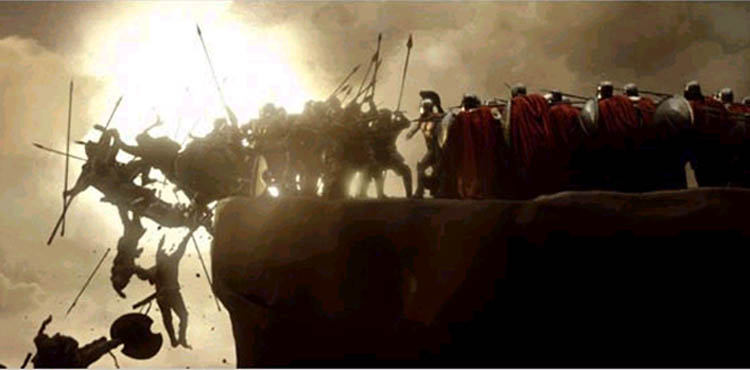

© All material Copyright 2007 by Bill Weintraub. All rights reserved.
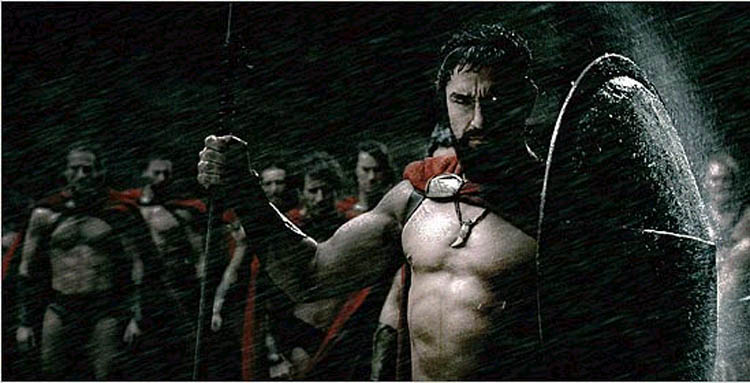
Re: NY Times attacks "Manly" movie and its "Warrior Ethic"
3-26-2007
My elderly brother took me to watch "300" today.
And as an ancient Greece culture lover, a comic-books collector, an action flicks enthusiast, a libertarian, a martial artist and as a Frot Man -- all I can tell now is --
: )
I think that I know what is the first Blu-Ray/ HD DVD disk I am going to buy!
"It's only an eye"
-Dilion to Leonidas
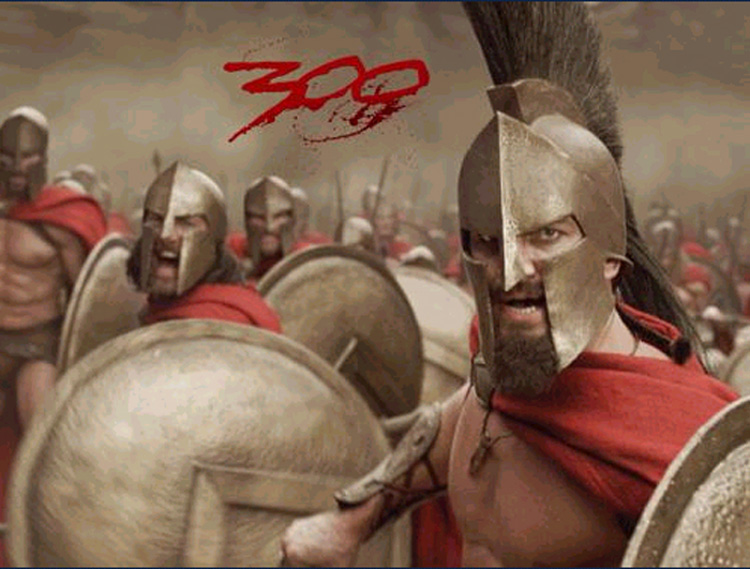
Re: NY Times attacks "Manly" movie and its "Warrior Ethic"
3-27-2007
I saw the film recently and thought it was prety good. I'm a visual art nut so I loved the art direction. Being someone who is into body art I was not at all offended by the persians. Useualy the villians in Films have the cooler costumes. The whole club inspired thing was probably for hipness sake more than anything. The only thing homophobic I saw in the film is when the king refered to greeks as "Philosipher boy lovers" But at the same time he was reconizing their reistance. The 3 things that kind of bogged me down was one the treatment of the boy in training. Yeah I know it was hard times back then but I couldn't imagine treating a child like that. Our millitary does just fine training adults. 2nd was the over all dismisal of mysticism. Yes the preists in the film where sell out bastards. But the mystic path is an honorable one as well as a nessesity to keep the vibe in ballance. And third the non spartan greeks where knocked down for not being pro warriors, but hey somebody has to build, farm, and such. But other than than that it was great and did get me more interested in that time period. Btw Did those poor dudes realy fight naked? I love being nude as much as the next guy But I don't think it would be either safe nor comfortable to work that way let alone fight(training aside). I have heard that men cooked naked back in the day due to the heat of wood ovens and no vents. bet the where real carefull with the hot oil. ;-)
Re: NY Times attacks "Manly" movie and its "Warrior Ethic"
5-21-2007
Hi JK
I'm glad you saw the movie and enjoyed it.
JK, you said you didn't like "the treatment of the boy in training"
(What the movie shows, for those who haven't seen it, is a very brief scene of two boys fighting.)
JK, this is something which is really crucial and which you don't seem to understand.
Boys must learn how to fight.
It's essential for boys -- even now -- especially now -- that they learn how to fight WHEN they are boys.
And boys learn how to fight as part of a male group.
That's what's in all those quotes from my foreign friend.
He talks about the "roughs and toughs of life."
Boys MUST learn that in and from their group.
Here's what my foreign friend says:
Masculine male groups and bonds play an extremely important role in the development of physical, mental, emotional and social aspects of natural masculinity. As such they are an important part of the positive environment that all masculine identified boys should have. An otherwise masculine identified man who is deprived of membership in a masculine male group / bond during his growing years will be less than 1/4th naturally masculine than if he had such an opportunity. Masculine identified boys have a natural tendency to seek to join male-only groups, and it's their natural right.
The masculinity of men flows from their group. It's like their natural masculinity combines and gets manifold when masculine identified men unite. The camaraderie, mutual understanding, support, playing together, learning the ways of the world as a male, dealing with roughs and toughs of life together --- they all help to develop the natural masculinity that exists within him.
Boys who don't have those experiences, including fight experiences, end up lacking in NATURAL masculinity.
Can boys who don't have those experiences as boys make up for that as adults?
Yes.
By training in a fight sport.
And JK, as I keep telling you, that's something you need to do.
And you know what?
Once you start doing it, not only will you really like it, but you'll discover that you're good at it.
So: the Spartans put boys in groups, and taught them and encouraged them to fight.
All cultures, with the exception of our own at present, do that.
And that's what the movie was portraying.
In the movie the fight looked brutal.
That's how it would have looked to a kid.
When I saw the movie, there was a kid sitting in the row behind me and he gasped when he saw that scene.
Which is good.
The agoge, in addition to providing necessary male experiences, was designed to make the Warrior extremely tough.
But, as classicist W. G. Forrest points out in a quote earlier in this message thread, that's not unusual in Warrior societies.
If you read Charles Eastman's account of his own Sioux Warrior boyhood, for example, which we discuss in The Comradeship of Wounds, the training and ethos sounds very similar to that of the agoge.
So learning how to fight as a boy, and being tough, matters.
Was that toughness what enabled the Spartans to stand and die at Thermopylae?
Yes.
Here's a Spartan poet Tyrtaeus, ca 650 BC:
You are the unconquered blood of Herakles.
So be brave, fear not the number of your enemy
Stand straight in the front rank with your shield before you
and see your life as your enemy; the darkness of
death should be welcome as the light of the sun.
JK, you also asked "Did those dudes realy fight naked?"
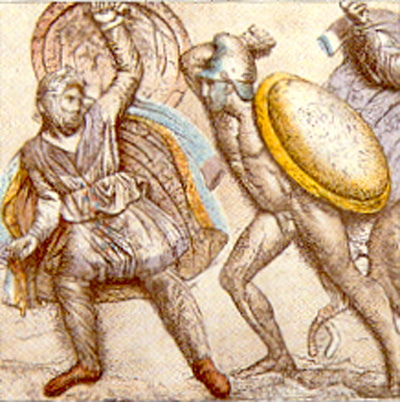
Yes, they did.
We've talked about that a lot.
JK -- in the movie Leonidas says to Ephialtes that a Hoplite Warrior is protected by the shield of the man standing next to him, and that shield covers him from his thigh to his neck.
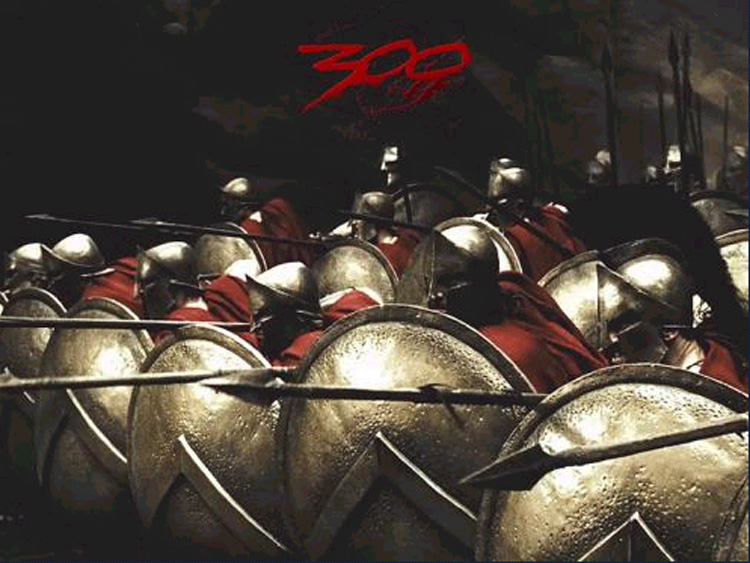
That's how it worked.
They wore armour -- greaves -- on their lower legs.
They had helmets.
Everything in between was protected by their shields.
Including their genitals.
They didn't wear jockstraps or codpieces or anything else.
They didn't need them.
That's the basic hoplite panoply:
helmet, shield, greaves, spear -- and maybe a sword
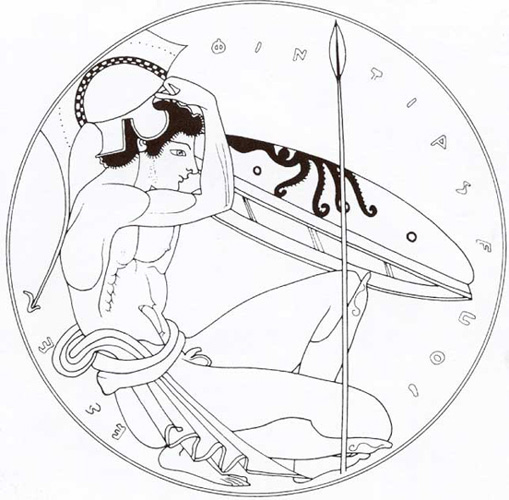
Here's another poem by Tyrtaeus which describes hoplite warfare:
Let each man hold, standing firm, both feet planted on the ground,
biting his lip with his teeth, covering with the belly of his broad
shield his thighs and legs, his chest and shoulders . . let each man,
Closing with the enemy, fighting hand-to-hand with long spear or
sword, wound and take him; and setting foot against foot, and resting
shield against shield, crest against crest, helmet against helmet
let him fight his man chest to chest, grasping the hilt of his sword
or of his long spear.For the man is not brave in war, unless he endure seeing the bloody
slaughter, and standing close reach out for the foe. This is excellence, this is the
best and loveliest prize for the young man to win. A common good this,
for the whole city and all the people, when a man holds, firm-set among the
fighters, unflinchingly.....For it is a fine thing for a brave man to die, falling among the front-fighters,
fighting for his fatherland.....

In the movie the guys do a lot of ninja-like moves.
And I think that's one of the reasons the movie has them wearing those jockstrap-codpieces.
Rather than, let's say, loincloths.
Because in a loincloth, their genitals would have been exposed when they started leaping into the air.
In real life, they weren't ninja.
For one thing, just the helmet, shield, and greaves, were heavy.
They couldn't run or even march for long with them on -- let alone do spinning back kicks.
Now, let's take a look at what the Spartans achieved:
Sparta as an independent state lasted from 950 to 192 BC.
That's 758 years.
For almost 200 consecutive years of those 758, the Spartan hoplite line was never broken and never defeated in fixed battle.
That's a formidable record; and I don't know if we could say the same of the American army.
America has won all its major wars post-1812; but the American army has suffered some severe if temporary defeats along the way.
What's more, prior to 370 the city of Sparta was never invaded.
The reputation of the Spartan Warrior was so fearsome that the city didn't even have walls for most of its 758 years of independent existence.
During the period of its military superiority, Sparta without question saved Greece from being over-run by the Persians, first at Thermopylae, and then at Platea.
And before her defeat of Persia, by the way, Sparta helped eliminate the group of rulers known as "tyrants" from Greece.
Part of the reason for that was that many of the tyrants were just a tad too cozy with the Persians.
In 545 BC -- that is, 65 years before Thermopylae -- the Spartans sent a delegation to the Great King warning him that they would never allow Greeks to become his subjects.
Given the relative size of Persia vs Sparta, that was brave -- to say the least.
In the years that followed, Sparta took a number of actions against Greek tyrants, including and most famously sending an army to Athens to finish what the Athenian tyrannicides Harmodius and Aristogeiton had started: the deposing of Hippias, the last Athenian tyrant.
So it was the Spartans who made Athenian democracy possible.
Is that why they went to Athens?
Probably not -- they didn't like Hippias for a number of reasons.
But it would be a mistake to underestimate the Spartan love of liberty.
When a Spartan woman was being sold as a slave, and was asked by the auctioneer what she knew how to do, she replied, 'to be free'. When the man who bought her ordered her to do things that were not appropriate for a free woman, she said, 'you will regret that you have deprived yourself of such a possession', and committed suicide.
~ Plutarch, Sayings of Spartan Women
What about the Spartan social system?
Spartan society and the Spartan constitution were greatly admired by the other Greeks -- not all, but many.
For example, both Plato and Xenophon admired the Spartans.
Plato is one of the greatest intellects of all time.
And to appreciate what sort of a man Xenophon was, just read the Anabasis -- "The Persian Expedition."
Or his Hellenic Memoirs.
And Xenophon lived among the Spartans when they were already in decline.
Indeed, he witnessed the Spartan reaction to their defeat at Leuctra.
And remained a great admirer.
Arguably, the Spartan constitution was a major influence on the Roman constitution, and it certainly influenced our own.
Though there are disputes about the date, W. G. Forrest argues that the constitution was established in 676 BC, and he says that it was in its day, "the most advanced constitution in Greece" -- in which "the interests of all Spartans, rich and poor, were homogenous and constant."
So it established a large degree of equality.
Not something that was common in 676 BC.
Said one poet, Terpander, writing in that same year of 676:
The spear-points of young men blossom there ...
and justice is done in open air,
the help of gallant enterprise.
"the spear-points of young men blossom there" is a beautiful phrase, mixing the erotic with the martial.
And when he says, "justice is done in open air," he's referring to the Assembly, which met out-of-doors; and he's also saying that justice is transparent in Sparta.
Again, that's impressive.
So the Spartans experienced their constitution as -- just.
The Spartans had an Assembly; an upper house called the Gerousia, which was a sort of combination Senate and Supreme Court; a dual kingship, which the Romans emulated in their dual consuls; and five ephors who were elected anually *by the Assembly* and who could serve for one year only.
So I guess the Spartans invented term limits too.
Those *elected* ephors were quite powerful by the way -- they could call kings to account.
Demaratus, former Spartan king who was an exile in Xerxes' court:
When someone asked why he, a king, was an exile from Sparta, he replied, "Because her laws are more powerful than I am."
~ Plutarch, Sayings of the Spartans
That's a remarkable statement -- because other than Sparta's, there were virtually no kings prior to the Glorious Revolution of 1688 who had to live with those sorts of constitutional restraints.
Equally impressive, in my view, were Spartan social arrangements.
The agoge was so set up that any adult Spartan male -- any of the homoioi or Equals -- could, if the situation required, take over the training of the boys.
Which means, I suspect, that the Spartans had the only true communal child-rearing system in the Western world prior to the invention of the Israeli kibbutz.
And which also means, I also suspect, that for all its rigors, the boys in the agoge must have felt very secure.
Because there were always Men around to see to their welfare.
Of course each Spartan male was given a plot of ground at birth.
From which he was later expected to provide food for his communal mess.
The Spartan system was also communistic in other ways, though how much so is debated.
But we know that to some degree any one of the homoioi could make use of hunting dogs or a horse or an implement, and just return them to wherever he borrowed them from.
The Spartans treated women far better than the other Greeks, believing that a free woman would be a healthy woman and that a healthy woman would produce healthy children.
As a consequence, women were far freer at Sparta than they were in Athens or the other city-states.
And they knew it:
When Gorgo [wife of King Leonidas] was asked by a woman from Attica, 'Why are you Spartan women the only ones who rule over their husbands', she answered, 'Because only we are the mothers of men'.
~ Plutarch, Sayings of Spartan Women
The Spartans also practiced, at times, forms of group marriage.
For example, Xenophon tells us, in The Spartan Constitution, that
for the production of children, the elderly husband could introduce to his wife any man whose physique and personality he admired. Further, should a man not wish to be married, but still be eager to have remarkable children, Lycurgus [,the Spartan law-giver,] also made it lawful for him to have children by any fertile and well-bred woman who came to his attention, subject to her husband's consent. And he would approve many such arrangements. For the women want to have two households, while the men want to acquire for their sons brothers who would form part of the family and its influence, but would have no claim on the estate.
...
The question of whether he did thereby endow Sparta with men whose size and strength are in any way superior, is for anyone who wishes to investigate for himself.
Interesting.
"the women want to have two households, while the men want to acquire for their sons brothers who would form part of the family and its influence..."
What a great idea.
The woman presumably has more freedom and more authority, the man has more sons, and the boys are sure to have brothers.
I would have loved that.
And it fits with other reports of the Spartans, and of Spartan women:
When Gorgo's husband Leonidas was about to go off to Thermopylae, in order to encourage him to be worthy of Sparta, she asked what she should do, he said, 'Marry a good husband and bear good children'.
Another woman was burying her son, when an ordinary old woman came up to her and said: 'Poor woman, what a misfortune.' The first woman said, 'No, what good fortune, by the twin gods, for this is why I bore him, so that he might die for Sparta, and now that is what has come to pass'.
When another Spartan woman handed her son his shield, she exhorted him, 'Son, come back either with this or on it'.
When a Spartan woman was sold as a slave and asked what she knew how to do, she said, 'to be faithful'.
Another, when taken as a captive and asked the same question, answered 'to run a household well'.
When someone asked another woman, if she would be good, if he bought her, she said that she would, 'and also if you do not buy me'.
~ Plutarch, Sayings of Spartan Women
Of course, Xenophon doesn't say whether the woman got to refuse if she didn't want to sleep with the guy "whose physique and personality her husband admired."
I would suspect she did -- again because the status of women was high.
And remember again that Spartan women took great pride in the children they bore:
When an Ionian woman prided herself on something she had woven, a Spartan woman boasted of her four beautiful sons, saying 'such should be the works of a fine woman and upon this is what she should be proud of and boast about'.
~ Plutarch, Sayings of Spartan Women
But can you imagine that?
Elderly Joe saying to his young wife, "You know, Ted has a really great body, and he's a real charmer. How bout if you two have a kid together? I know Junior would be happy to have a brother too."
Sparta by the way was tiny.
The numbers are debated, but it's unlikely that there were ever more than 10,000 Equals.
10,000.
Yet Sparta has had a tremendous influence on Western history.
The Spartans steadfastly defended their freedom against first the Persians and then the Macedonians and then the Romans.
Of course they were eventually conquered by Rome.
But, looking at the long sweep of Spartan history, you have to say that they valued freedom -- in the constitutional sense -- and their own independence -- above all.
Sparta continued to exist under Roman rule; during the Hadrianic era and for some time thereafter it was a tourist attraction; and there are still people living in the vicinity of Sparta today.
So what did the Spartans achieve?
W. G. Forrest says that
Sparta was the first state we know of to accept the idea that all citizens, qua citizens, were equal and to devise a constitution which allowed these citizens a defined and substantial say in running their city.
That was ca 676 BC.
About a hundred years later, Forrest says, Sparta was again "at the head of Greek political development" when it accepted the growth of a federal constitution among its Peloponnesian allies.
Sparta made a mess of things abroad after the Persian wars and particularly after winning the Peloponnesian War against Athens.
However, Sparta's loyalty to its egalitarian constitution and its devotion to the idea of freedom made it the leader when, in the following century, the lack of social mobility was destroying Greece.
Forrest:
It was again a Spartan who took the first steps to remedy [the situation], not an underprivileged Spartan but a king [Agis]. And while there were sporadic attempts at change elsewhere, it was again only in Sparta that we see a strong and persistent revolutionary movement running right through to the last collapse [ -- the Roman conquest.] A touch of the old stubbornness, perhaps, but in a better cause, and with very much more than a touch of the real spirit of Lycurgus.
A true Greek revolution fueled by Lycurgan -- that is, Spartan -- ideals of equality -- would have been something.
So:
1. The Spartans were the first people to develop a constitution which guaranteed every citizen basic rights.
And they did it long before the other Greeks.
The adoption of that constitution was a revolution, and it was carried out with far less resistance from the "aristocracy" than most revolutions have seen before or since.
2. Towards the end of Sparta's -- and the Greeks' -- independent existence, it was the Spartans who recognized that something needed to be done about the lack of social mobility among the Greeks, and who led the way.
They were conquered by Rome and so they didn't succeed.
But what they were attempting to do was extend the benefits of their Eunomia -- their good and equal rule -- to all Greece.
So I think the Spartan achievement was impressive.
Now, I've been quoting a lot from W. G. Forrest's 1968 history of Sparta, in part because he really doesn't like the Spartans.
What you've been hearing then is what someone who doesn't admire Sparta has to say.
What is the source of his dislike?
Well, unlike some of the other Greek city-states, which were innovative and gave us so much in the arts and sciences, Sparta was very inward looking.
There's no Spartan Aristotle, or Aeschyles, or Herodotus.
At least none that we know of.
But the reason for that, in my view, is that what concerned the Spartans was, again, their "Eunomia" -- their "Good Rule."
Sparta was an experiment in a constitutional Warrior Society.
And it's into that experiment that Sparta put all its energies.
In so doing, I maintain, Sparta gave the world great gifts.
Different from those of the Athenians or Thespians, but gifts nonetheless.
I also suspect very strongly that Forrest had an intense dislike of Spartan Warrior Homosex.
He never mentions it -- the book was published in 1968 after all -- but I think his homophobia is powering some of his other distaste.
For Sparta, after all, doesn't have a Plato to sugarcoat and sublimate its Homosex.
The homosex and the aggression are there and they're raw.
Raw Warrior aggression.
Raw Warrior homosex.
Not easy for a Fellow of Wadham College, Oxford, to handle in 1968.
Forrest is very hard on Sparta after it had won the Peloponnesian War.
But Sparta at the close of that war was in a position analogous to America's at the close of the cold war.
The analogy is not precise, but it's close enough.
And Sparta made a hash of it -- just as America's been doing.
Fact is, the Spartan system as devised by Lycurgus -- assuming there was a Lycurgus -- wasn't meant for a world power.
Nor was the American system.
Nor the Roman system.
In each case, the constitution was intended for the government of a small and relatively self-sufficient state.
Whether any constitutional state can withstand the demands and particularly the wealth produced by empire -- is still an open question.
As I said earlier, Plutarch attributed Sparta's decline to the gold and silver which began flooding the city after it gained the hegemony of Greece.
Looking at how bloated with wealth America is today, and the growing gap between rich and poor -- maybe we have cause to be concerned.
Now: coming back to the 300:
What's remarkable is the level of derision and abuse which the movie drew from the critics.
Had the movie openly and *realistically* expressed the sexual element of the agoge and of the Spartan Warriors' lives, would that criticism have been muted in some way?
I don't know, but I don't think so.
Because the discourse about sex and particularly about sex between men in our society is so polarized into gay vs straight that I think it would have been impossible for the movie to discuss those issues -- which are essentially our issues -- in a way that would not have provoked even more derision and abuse.
And from the same critics.
If it had depicted the Spartans loving each other as MEN -- in a MANLY way -- to use A O Scott's words, words we're not afraid of -- in a way which was true to their WARRIOR ETHIC -- in way which celebrated VALOR and FREEDOM -- in a way which served a NOBLE PURPOSE and a HIGHER CAUSE -- in a way which was HARD and VALIANT and even partook of WRESTLING -- and contrasted that with the decadence and luxury and effeminacy and eunuchs and buttfucking and SLAVE ETHOS among the Persians -- it would have been condemned.
Yet that's the movie which needs to be made.
A movie which celebrates WARRIORS loving each other as WARRIORS.
MEN loving each other as MEN.
In an earlier post, I said I'd seen the movie twice.
And I added:
I felt sad on the third day, knowing that I couldn't go again.
Having had a glimpse, on the screen and in my many books, of all that had been taken from me -- and which I could never recover.
I'm now 58 -- soon to be 59.
If I lived 20 more years might I begin to see the restoration of the Warrior Ethos?
Maybe.
But I'd be far too old to partake of it.
Sparta was a social experiment.
Arguably all of Greece was.
The great empires to the south and east -- Egyptian and Sumerian-Babylonian-Assyrian-Persian -- were politically and socially static.
The Greeks innovated.
And once they got going they moved really fast.
Historians complain that Sparta didn't evolve.
But maybe that's because they didn't feel the need to.
They had a good thing going -- a good rule.
It's telling that toward the end, what they were trying to do was get back to their original Lycurgan values.
The values of the agoge.
And that's what I think we should do too.
In closing, let's look again at the Spartan and Greek achievement against the Persian Empire; and at the Greek attitude towards war and fighting.
This map shows the relative sizes of Greece -- a disunited collection of indepedent city states; and the vast, unified Persian Empire, ruled by the unquestionable will of a single individual.

Kinda Bambi meets Godzilla isn't it?
But in this case, Godzilla's the one who got stomped:
Here's Victor Davis Hanson in The Ancient Greeks at War:
[Following Thermopylae, and] with the defeat of his fleet at Salamis, Xerxes retreated to his palace and harem, leaving his henchman Mardonius with an enormous land army in Attica, and orders to finish off the nearby Greek infantry before subduing the last remaining free city-states south of the isthmus. True, the Greeks' first victory against the Persians now meant that they were safe from sea-born attack to the rear, and the invaders were without naval support or the watchful eye of their dreaded king. But all of Greece from Athens northward was still in Persian hands, and there was an army of thousands that remained in the field to be annihilated.
The next summer the Hellenic alliance agreed to meet the army of Mardonius in Boeotia, and filed into the small town of Plataea, mustering the greatest army in the entire history of hoplite warfare, a force of at least 60,000 heavy infantry and perhaps an equal number of light-armed auxiliaries -- even Alexander the Great never fielded forces of such size. Yet the Greek hoplites were still outnumbered, and the army had no cavalry of the number or caliber to match Mardonius' horsemen -- it was left to Philip II a century and a half later to develop heavy cavalry, armored and equipped with a lance, to overwhelm eastern mounted archers and javelin-throwers.
The allied commander, the Spartan regent Pausanias, was not about to expose his lumbering infantry in the wide plains of Boeotia, and sought instead to keep his army near the flanks of Mount Cithaeron, where reinforcements from throughout Greece poured in daily over the mountains, each man swearing formally,
'I shall fight to the death; I shall put freedom before life.'
Each side jockeyed for positions. Finally the Persians sent their cavalry against the Greek right wing, while the Medizing Boeotians attacked the Athenians over on the left. The Spartans and the nearby men of Tegea endured repeated cavalry and archery attacks, and then slowly went on the offensive, crashing into the enemy light infantry, destroying their left wing, killing Mardonius, and causing the entire Persian line to crumble and scatter to the north. Casualty ratios of thousands to a few hundred again revealed the superiority of hoplite infantry.
Scholars, ancient and modern, have faulted the tactical plan of Mardonius. In their view, he ignored the lessons of Marathon, foolishly entering a set battle with Greek heavy infantry, when the great plain of Boeotia gave an opportunity for hit-and-run attacks and for sudden sweeps of horsemen, which could pin the Greeks to the hills and slowly erode their fragile cohesion. Yet invaders far from home inevitably lose -- as examples from Hannibal to the Americans in Vietnam attest -- if they cannot force a decisive battle with the majority of forces of the invaded.
The difference in leadership between imperial Persians and elected Greek generals was also unmistakable: Achaemenid kings, who did not fight, erected marvelous tombs recounting their personal bravery in battle; Greek generals who battled in the phalanx were ridiculed, fined, censored or exiled should they attempt to claim any personal responsibility for victory.
The verdict of Plataea, and the subsequent Greek victory in Asia Minor at Mycale, brought a climactic end to the entire dream of eastern conquest in Europe. This was no accident. Plataea reflects a general -- and inescapable -- truth at the heart of the Persian dilemma: ultimately, the finest infantry in the world stood between their idea of conquest, and sooner or later thousands of Greek hoplites had to be faced, battled against, and killed off. The subsequent history of the city-state confirmed there was not an army in the world that was up to the task.
That's the Spartan achievement -- and the Greek achievement.
It's the achievement of a culture of Free Men who, as I said in the Blacksburg message thread, regarded the willingness and ability to fight as crucial for Free Men.
Here again is Victor Davis Hanson:
War and the use of land are the building blocks of Aristotle's Politics and Plato's Republic. Both utopias assume that before man can speculate, contemplate, educate and argue, he must first figure out how to eat and how to fight. The soldier and the farmer may be forgotten or even despised in our own culture, but in the Greek mind agriculture and warfare were central to a workable society, in which both professions were to be controlled by a rational and egalitarian citizenry.
~ Hanson, The Wars of the Ancient Greeks
These were also Men who openly conducted love affairs with other Men.
And in those affairs they were both romantic and Faithful.
Those affairs were the love affairs of Free Men.
Let's look at, in that regard, some more "Sayings of the Spartans" as collected by Plutarch ca 100 AD:
- Demaratus, former Spartan king who was an exile in Xerxes' court:
When one of the Persians by persistent bribery had lured away the person Demaratus was in love with and was saying, "Spartan, I have hunted down your beloved," Demaratus replied, "By the gods, it's not you, it's the fact that you have bought him."
- Pausanias, regent for Leonidas' son Pleistarchus and commander at Platea:
When amongst the spoils some people were amazed at the extravagance of the Persian's clothing, he said: "Better for them to be men of great worth rather than to have possessions of great worth."
After the victory over the Persians at Platea, he gave orders that the Persian dinner which had been prepared beforehand should be served to his staff. Since it was incredibly expensive, he said: "By the gods, with a spread like this what greedy characters the Persians were to chase after our barley-bread."
- Pleistarchus, son of Leonidas, ruled 480 - 458:
To the man who asked the reason why the two Spartan royal lines do not derive their names from the first kings, Pleistarchus son of Leonidas responded: "Because they wanted to exercise royal power to excess, whereas their successors in no sense did."
- Eudimidas, late fourth-century king:
When someone was citing Sparta's glorious deeds against the Persians, and urging war against the Macedonians, he replied, "In my opinion you are not aware that this proposition is the same as taking on fifty wolves after overcoming a thousand sheep."
After Alexander the Great announced at Olympia that all exiles save Thebans [Thebes had resisted Alexander and had been destroyed by him] could go home, he said: "While this announcement is unfortunate for you Thebans, it is an honor nonetheless, since Alexander is frightened only of you."
- Cleomenes, king from ca. 520 - 491
When someone said, "After your frequent victories over the Argives in your wars against them, why haven't you wiped them out?", he replied: "We wouldn't wish to wipe them out, because we want sparring-partners for our young men."
When someone asked him why Spartiates do not dedicate their spoils from the enemies to the gods, he said: "Because they come from cowards."
- Leotychidas, king 491 - 469
When a snake had coiled around a key on the inside of a gate and the seers were declaring this to be a portent, he remarked: "It doesn't look like that to me. If instead the key had coiled round the snake, that would be a portent."
- Teleclus, eighth century king
When someone asked him how much property he owned, he said: "No more than enough."
- Charillus, eighth century king
He said to the man who asked why they wear their hair long: "This is the natural means of personal adornment, and it costs nothing."
Those are just a few of the sayings -- there are a great many of them in the slender volume titled Plutarch on Sparta (ISBN 0-14-044463-7), which I mentioned earlier in the thread.
So what do we see in these sayings?
Casual references to male-male love: Demaratus' beloved is bribed to leave him by a Persian.
And to the difference between the Greek conception of that Love -- which was the Love of Free Men, freely given; and the Persian, to whom lovers were a commodity to be bought and sold.
Disdain for luxury of the Persian sort, and a clear understanding that to be a Man of great worth is more important than to have possessions of great worth.
Respect for the rule of law and constitutional government -- even from the king.
A surprising contempt for superstition -- "If instead the key had coiled round the snake, that would be a portent." -- Surprising, given how superstitious in general the Greeks of that era were.
Resistance to the Macedonians, including praise for the Thebans, hereditary enemies of Sparta, for standing tall against Alexander.
Immense pride in the Warrior ethos -- boasting of keeping the Argives around to be "sparring partners" for their young warriors, and spurning the spoils of their enemies.
And pride in their simple and austere life, right down to their long hair, which they saw as *naturally* manly -- and as free.
The story of Leonidas and the 300, and of Sparta itself, has endured because it speaks to enduring human values.
Many of these values -- whether it's the value of fighting or the value of Love between Free Men -- our culture has lost sight of.
But the values nevertheless endure.
And, I have no question that Sparta is the best model the world has known of a constitutional Warrior State.
Is it a model which could be in some respects revived?
Yes.
There's a reason Sparta lasted for 758 years.
There's a reason Sparta was so admired by the ancients.
There's a reason Sparta is still admired today.
So the Spartan model could be revived -- if you had the will to do it.
Of course the material conditions of life have changed -- improved in some ways and deteriorated in others -- so the revival would not be exact.
But the core ideas would be there.
What's important is to act.
What will happen if you don't?
Nothing.
Most of you guys want partners -- lovers.
Well, here's the sad truth about that, as I put it forth in the jrock thread:
If you do nothing, you'll reach that distant shore --
and it will be just as empty as the one you're standing on now.
I've had some companions on my journey.
Men who've believed as I do.
Will you have companions?
Anything -- and anyone -- worth having, you're going to have to fight for.
And that will mean disagreeing with -- and often being disagreeable to -- the crowd.
That's how it is.
In my view, first of the gay movement, and now of the Frot Movement, participation is not optional.
You have to participate.
I call that "Living the Life of your Time."
Your time is whatever it is.
This isn't the Middle Ages and it isn't ancient Sparta.
It's your time and the battles you face are unique to it.
Leonidas recognized that the Life of his Time required that he make a stand at Thermopylae.
So he did.
And now he's a hero -- for all time.
Of course he got killed.
But if he hadn't made that stand, he'd have spent the rest of his life as a coward and a slave of the Persians.
Thinking about what he might have done.
And who he might have been.
Here's Victor Davis Hanson with a final word about Leonidas and the 300:
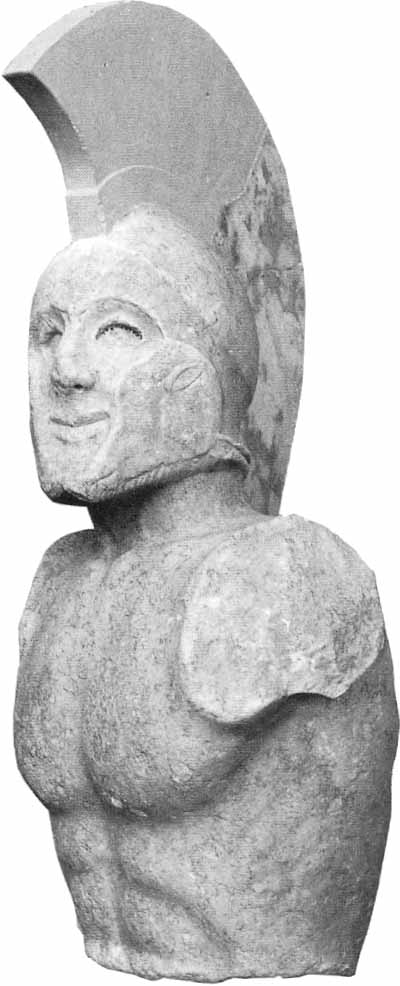
This early marble bust, which was found on the Spartan acropolis, is often associated with Leonidas, the heroic Spartan king who courageously chose to die, with 299 of his royal guard, at Thermopylae in 480. In fact, while the sculpture may represent another early Spartan hero or god, the stern expression of resolve, elegant though simple headgear, and muscular physique magnificently capture the Spartan ideal.
So the ideal is resolve, simplicity, and the Warrior ethos, here, as so often among the Greeks, expressed in a muscular physique.
Resolve:
- to live free
- to live simply
- to live as a Warrior
Bill Weintraub

© All material Copyright 2007 by Bill Weintraub. All rights reserved.
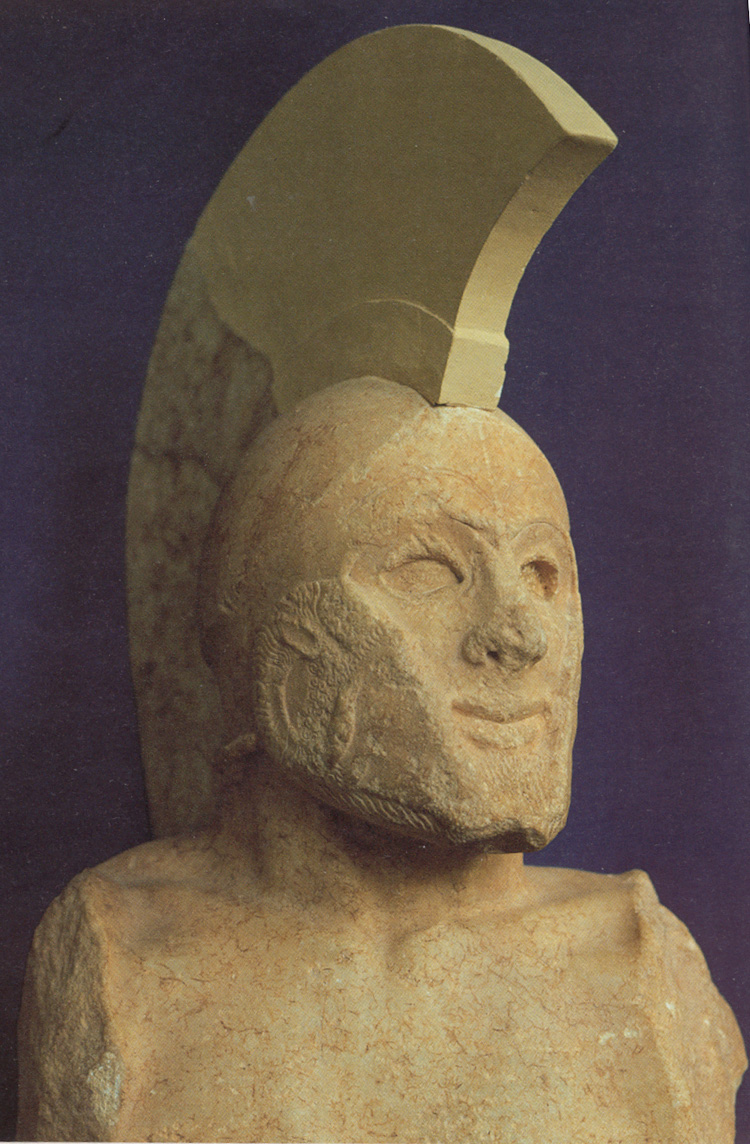
Leonidas of Sparta, ruled 491 - 480:
When the ephors said, "Haven't you decided to take any action beyond blocking the passes against the Persians?", "In theory, no," he said, "but in fact I plan to die for the Greeks."
When Xerxes wrote to him: "It is possible for you not to fight the gods but to side with me and be monarch of Greece," he wrote back: "If you understood what is honorable in life, you would avoid lusting after what belongs to others. For me, it is better to die for Greece, than to be monarch of the people of my race."
~ Plutarch, Sayings of the Spartans
Re: NY Times attacks "Manly" movie and its "Warrior Ethic"
5-28-2007
"It's unfortunate and indeed silly in the extreme that they're wearing little running shorts -- see actor on left -- because they didn't have running shorts in the 5th century BC. They didn't need them."
That's right because they were UNafraid to go naked in public, in war, with their balls in full view for all to see! Of course we can't expect today's penis--phobic society to show the way it REALLY was so the movie makers must pretend that in the 5th Century BC speedos were already invented. What a crock!
"Unlike the emasculated and effeminized males of modern America, they weren't afraid of their own scrotums. To the contrary, they were proud of them. That's why their scrotums, along with their penises, are almost always visible in Greek art."
Men and warriors were proud of their scrotums in the 5th Century BC. In comparison to today that PRIDE has been replaced with SHAME. Is it REALLY any wonder that so many males today feel ashamed and defeated? Shame and defeat come from being enslaved and males today ARE enslaved psychologically as the war against NATURAL MANHOOD continues to rage unchecked. We have come to live in a MAN HATING society that DISHONORS anything and everything NATURALLY MALE. Shame does wonders at not only controlling males but also defeating them from within their ownselves. Shame is a DESTROYER! Let us thank the Christian holy-rolling right and the homophobes for all this and for our present state of society WHICH, I'm afraid, is now standing on the brink of destruction.
"That's right. The War God is always there. He's in the collective unconscious of the Warriors. That means he's in your unconscious dude, just waiting for you to reclaim your Warrior Manhood and with it your FREEDOM."
Absolutely and not only your freedom but your SANITY! Males need to reach down into themselves and bring forth that natural, inner warrior because it is that part of a man that is the fighter and NOW is the time to stand up and fight back!!
"Frances: "Power is far less assured when you have a bunch of bonded warriors to deal with who demand a say in things because of the promise of their blood that vouch-safes the security of the state, and more importantly to warriors the promise of their warrior brother's blood."
"That's right. Denying Men their Manhood is about control. As Frances said, Men are controlled through their balls. And through the denial of the Warrior bond -- which they form through their balls. And isn't that what Mr Scott and his fellow feminized critics of the Times want? Not Free MEN but controlled males. You guys need to realize the extent to which reviews like this one contribute to the ongoing emasculation and enslavement of males. So to hell with A O Scott."
Men are controlled through their balls because your balls are one BIG thing that make men MEN. Unless you're a male you don't have them naturally. Society wants controlled men because men who are warriors and who are controlled by their balls are NOT controllable. They tend to challenge the status quo, stand up, and fight when necessary. That poses a threat to the status quo and the power elite. Men who have been inwardly destroyed, who are controlled and feminized are much easier to control and destroy. They won't challenge the power elite but will just go with the flow even if the flow goes right off into the abyss (just as it IS doing TODAY!).
"Next time around, I hope whoever makes the 300 will show true MEN with true BALLS. WARRIORS -- with their BALLS. WARRIORS -- who aren't afraid to LOVE -- other WARRIORS."
Me too BUT I don't think it will happen until MEN with BALLS actually dominate society again.
"That's what we're working for. A world in which MEN can once again be MEN. A world in which MEN can once again be WARRIORS. A world in which all MANKIND can be FREE."
And a world in which MASCULINE men can LOVE other masculine men naturally and unashamed and truly be brothers and WARRIORS!
Sir Robert
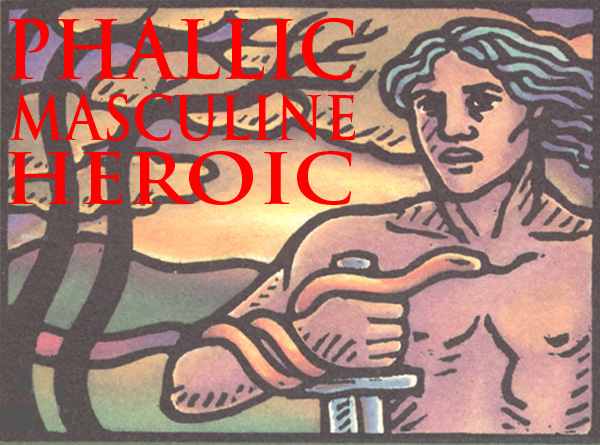



AND


Warriors Speak is presented by The Man2Man Alliance, an organization of men into Frot
To learn more about Frot, ck out What's Hot About Frot
Or visit our FAQs page.

| Heroes Site Guide | Toward a New Concept of M2M | What Sex Is |In Search of an Heroic Friend | Masculinity and Spirit |
| Jocks and Cocks | Gilgamesh | The Greeks | Hoplites! | The Warrior Bond | Nude Combat | Phallic, Masculine, Heroic | Reading |
| Heroic Homosex Home | Cockrub Warriors Home | Heroes Home | Story of Bill and Brett Home | Frot Club Home |
| Definitions | FAQs | Join Us | Contact Us | Tell Your Story |

© All material on this site Copyright 2001 - 2010 by Bill Weintraub. All rights reserved.



Alcman
Ephoros says that the public mess is still called andreia, or 'the men's mess' in Crete, but that at Sparta that name is obsolete, though it occurs in Alcman, as follows:
At feasts and in the companies
of the men's mess 'tis well beside them that sit at meat
to strike up and sing the Paean.


